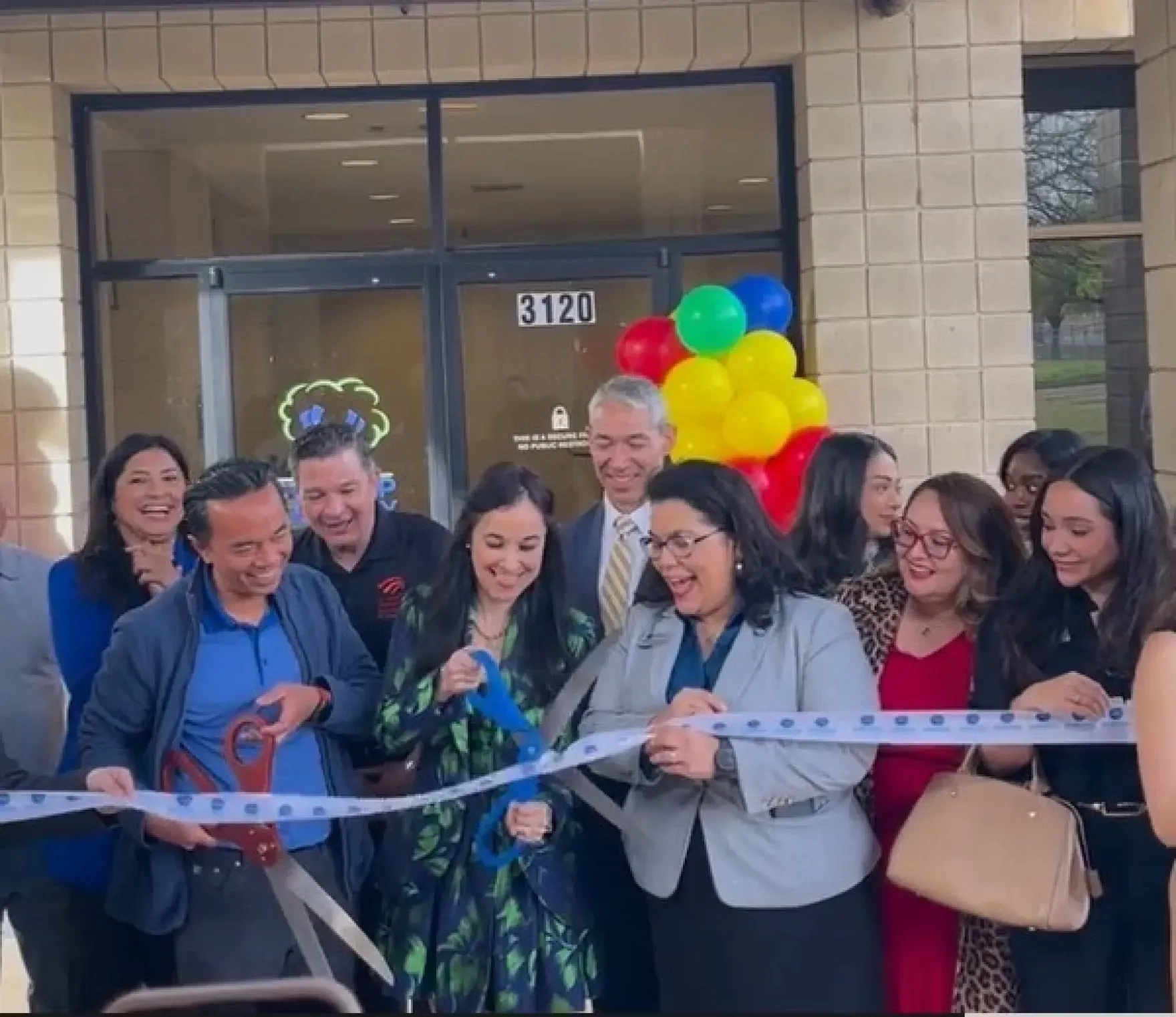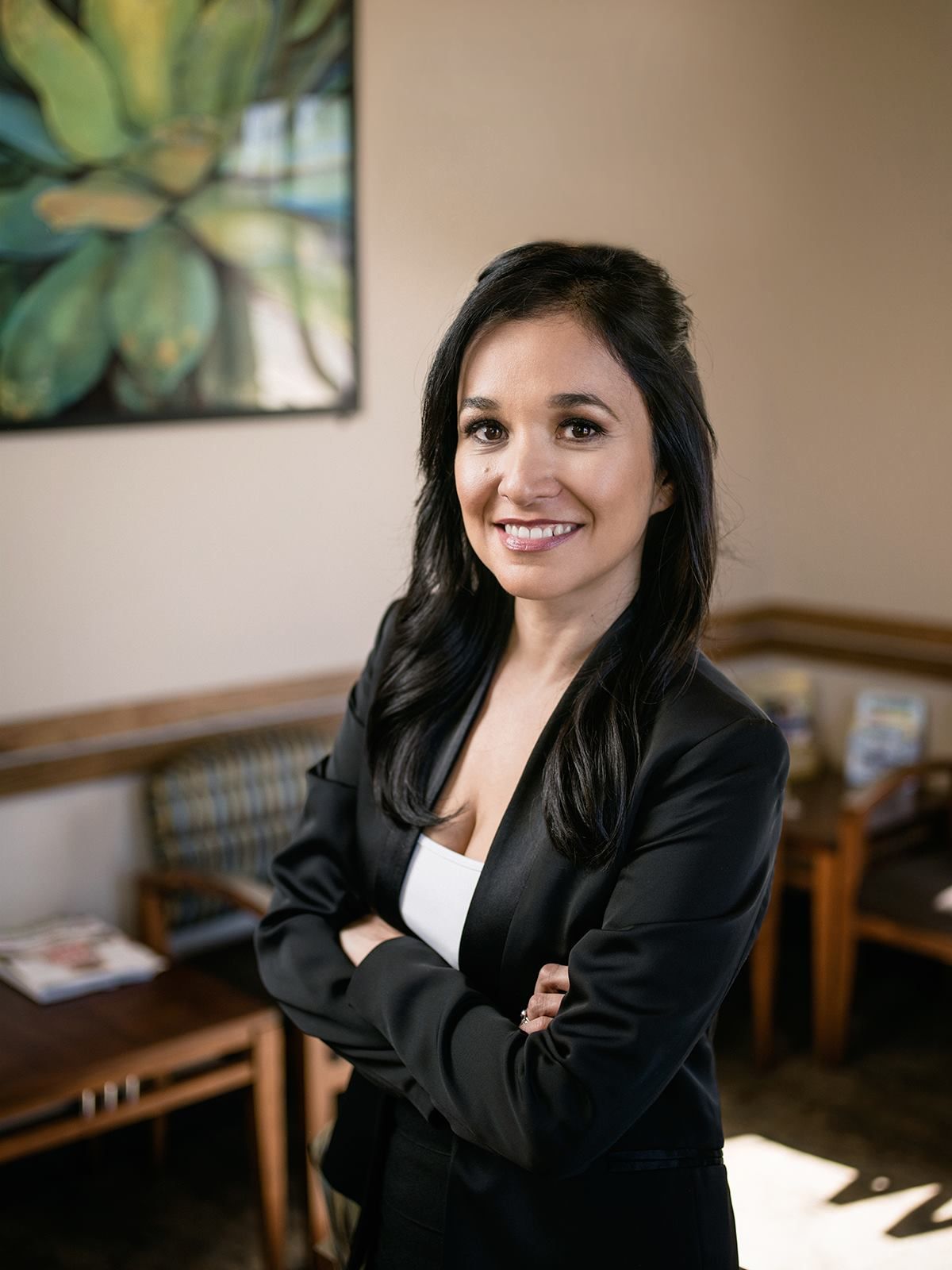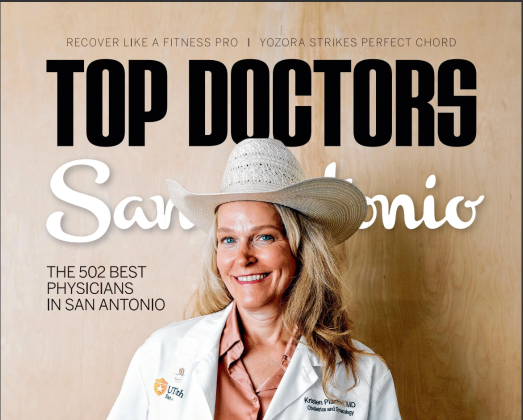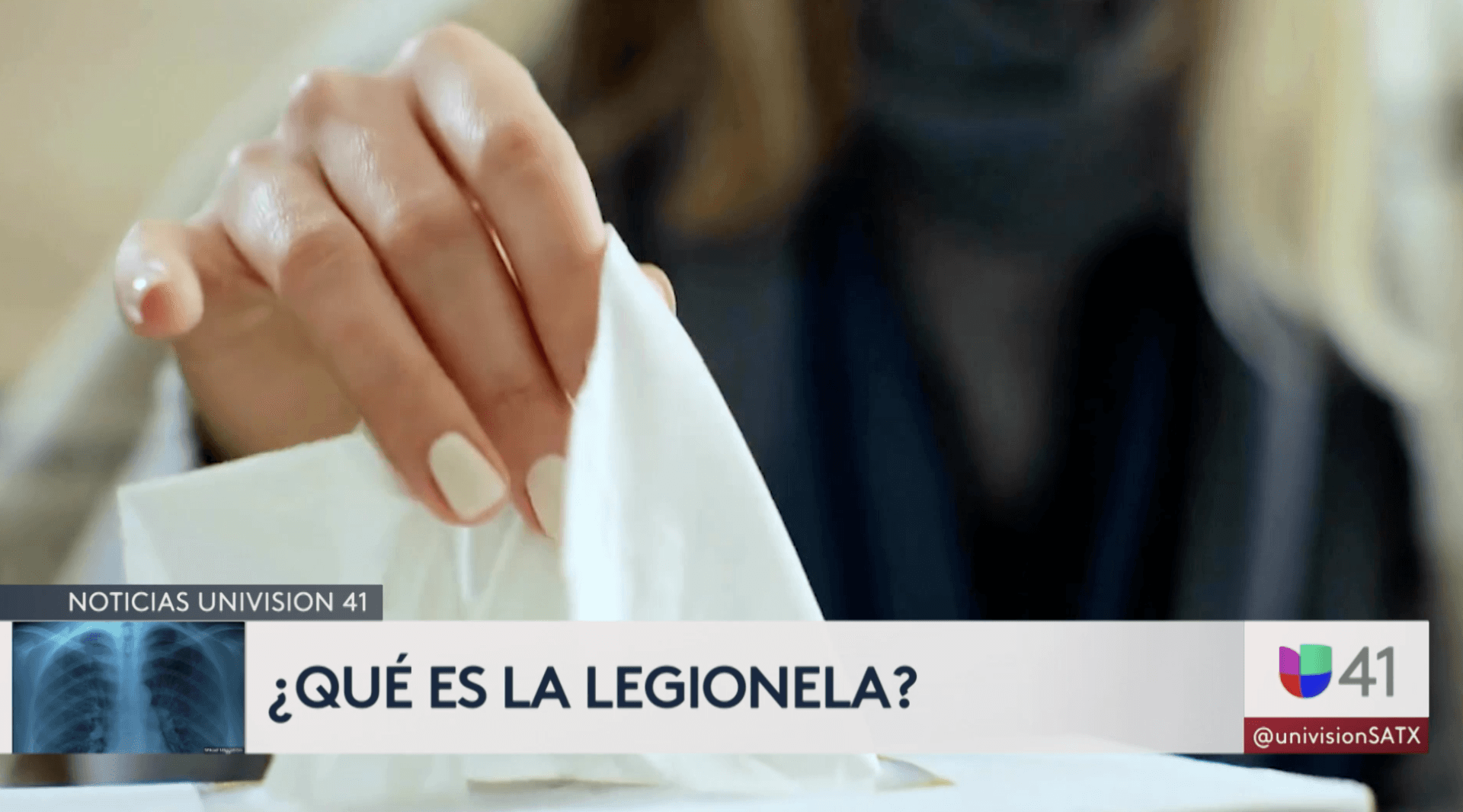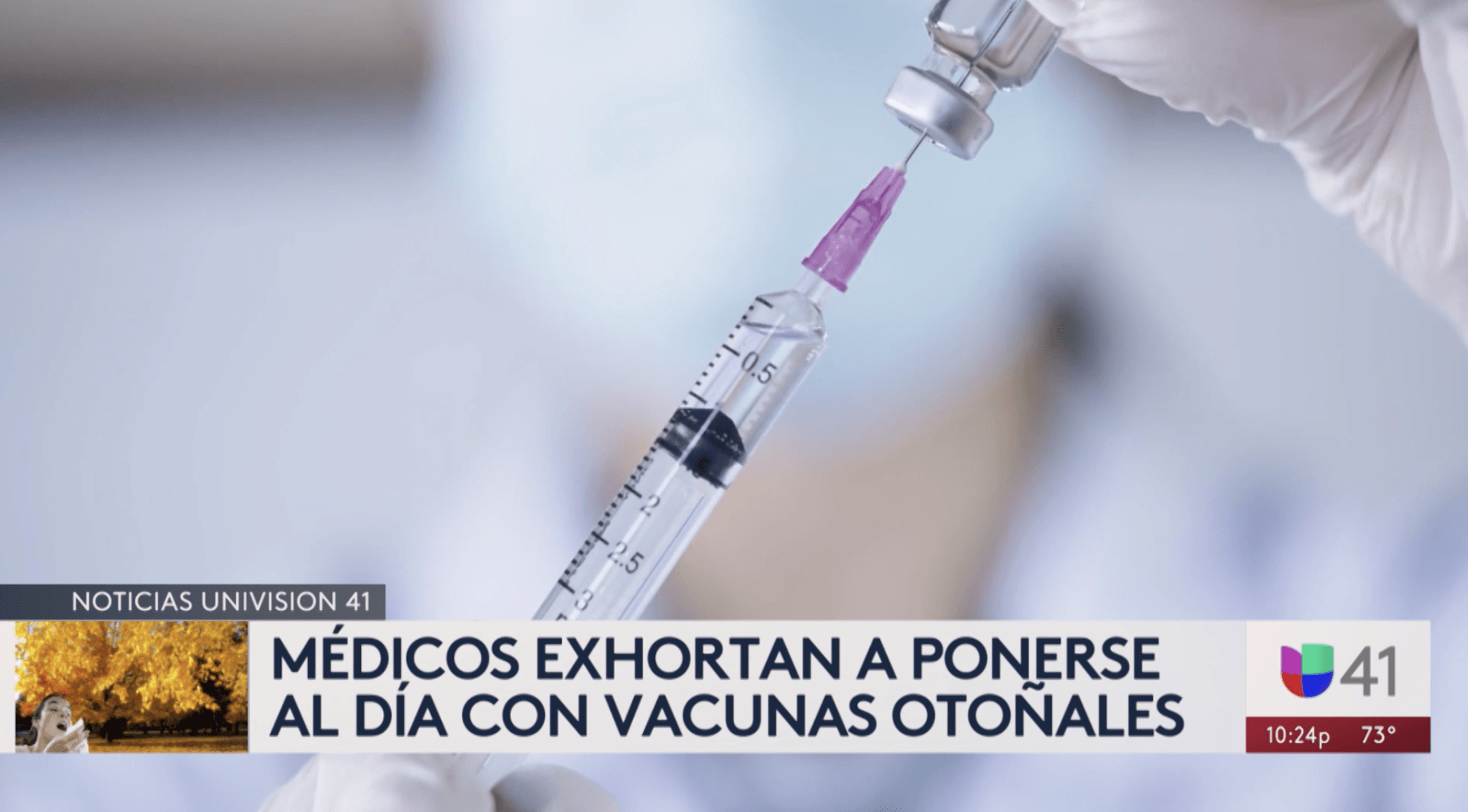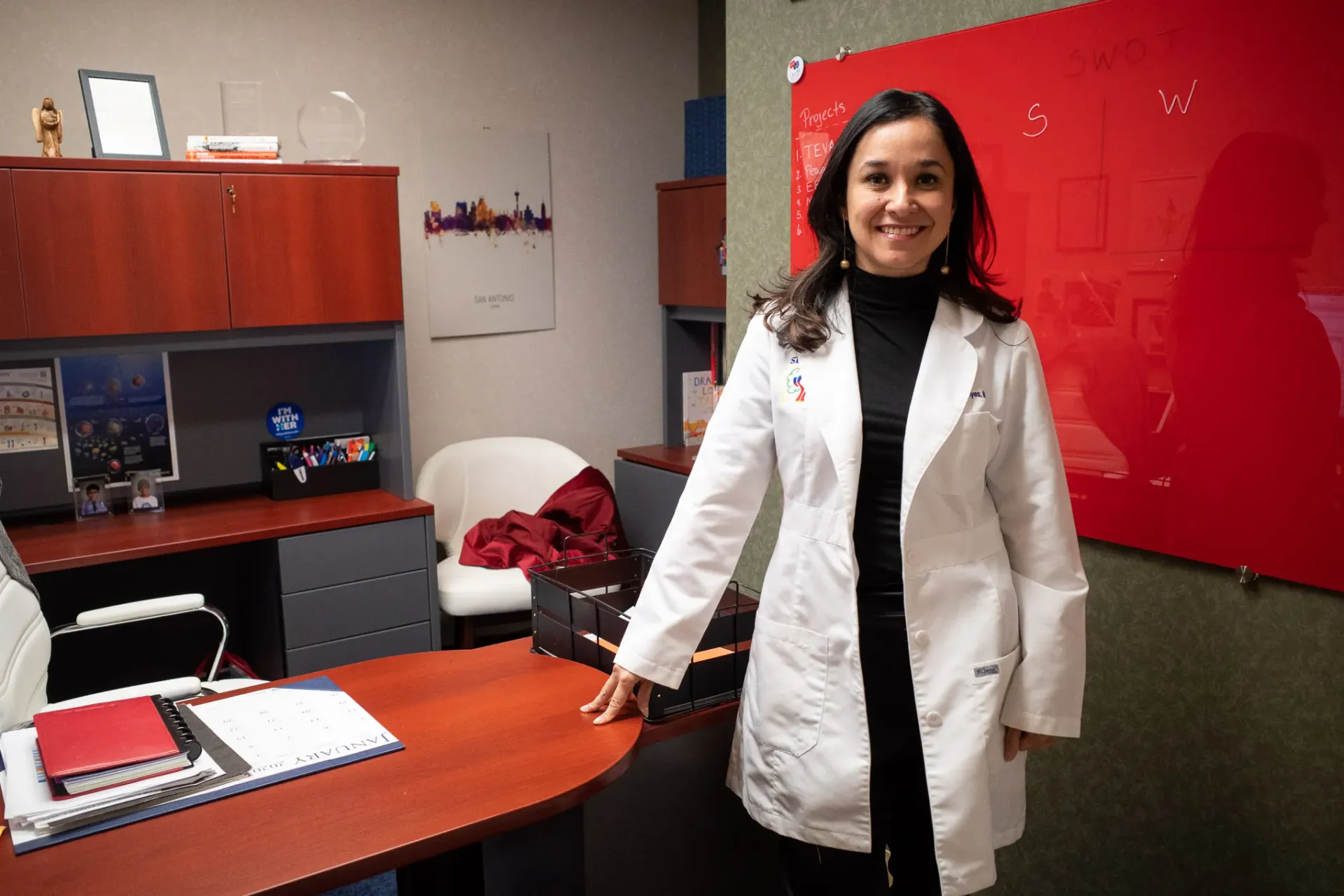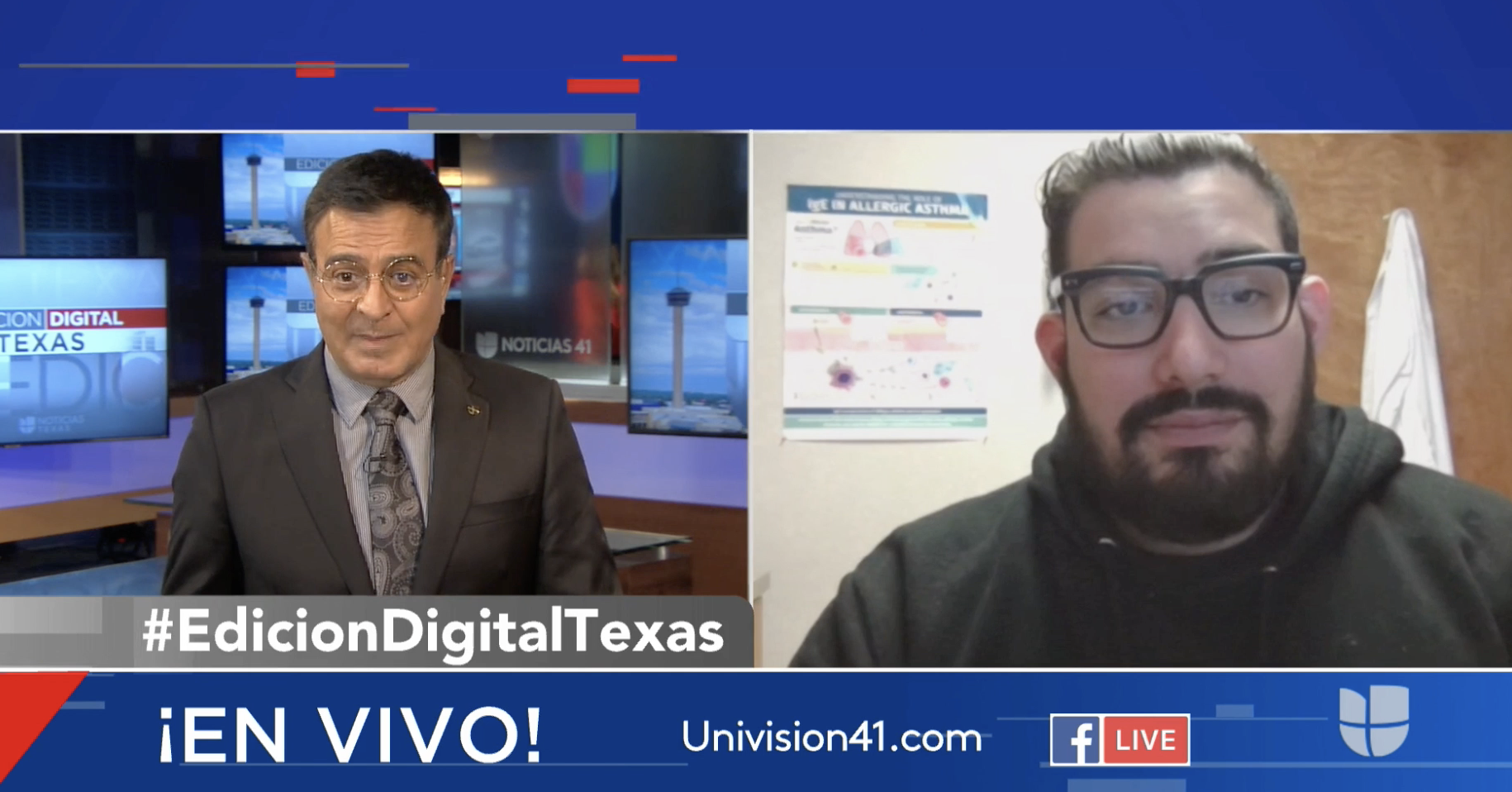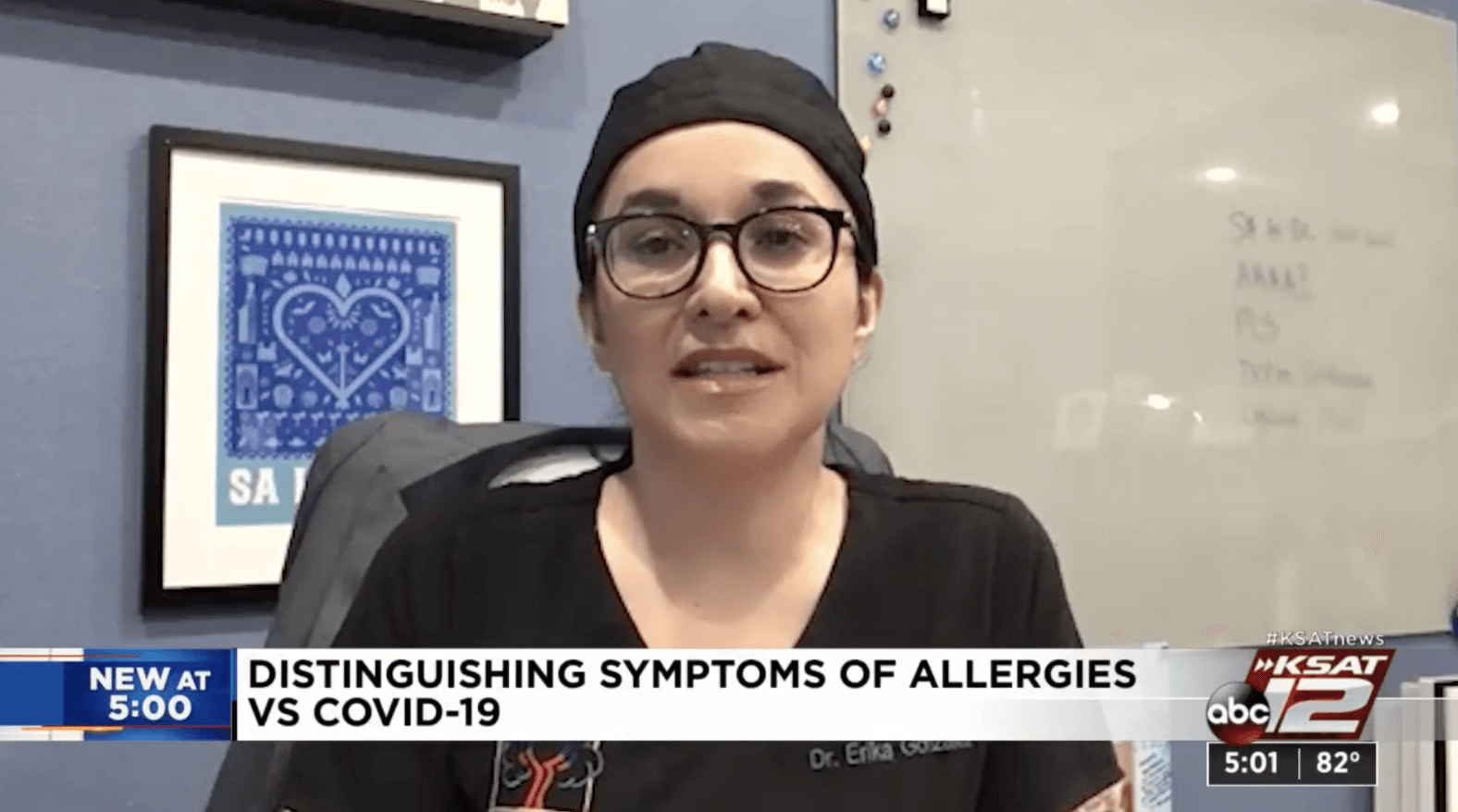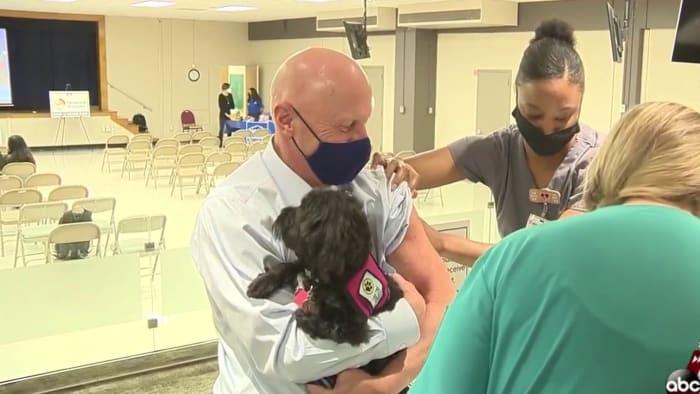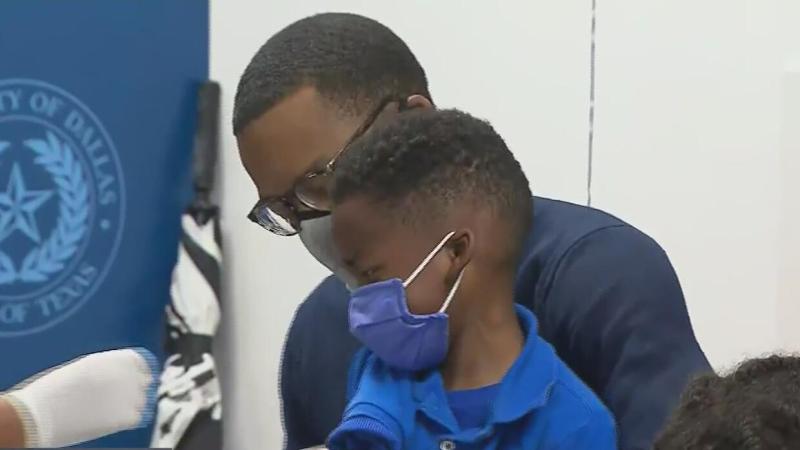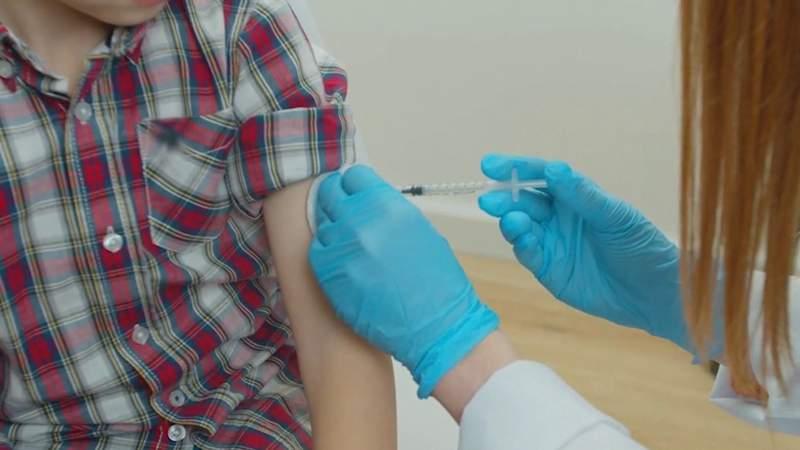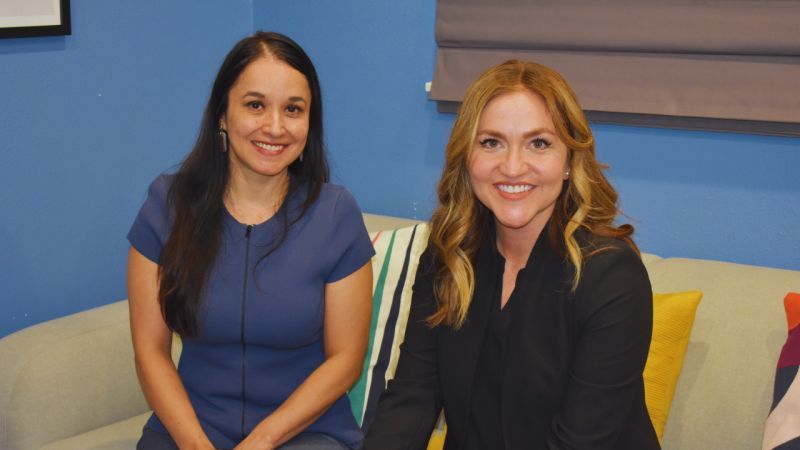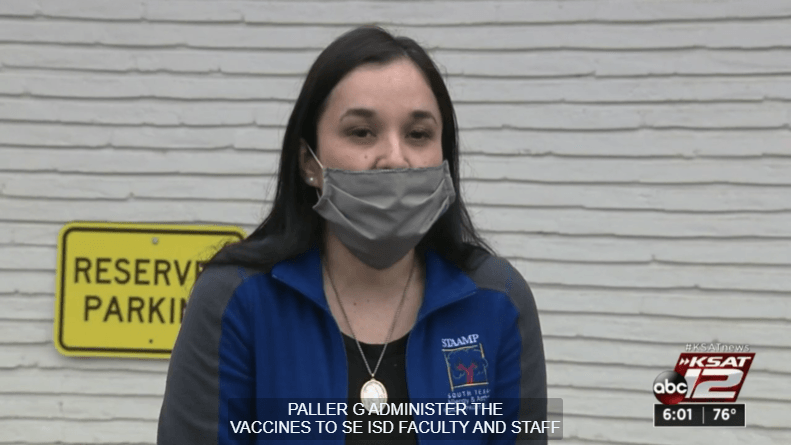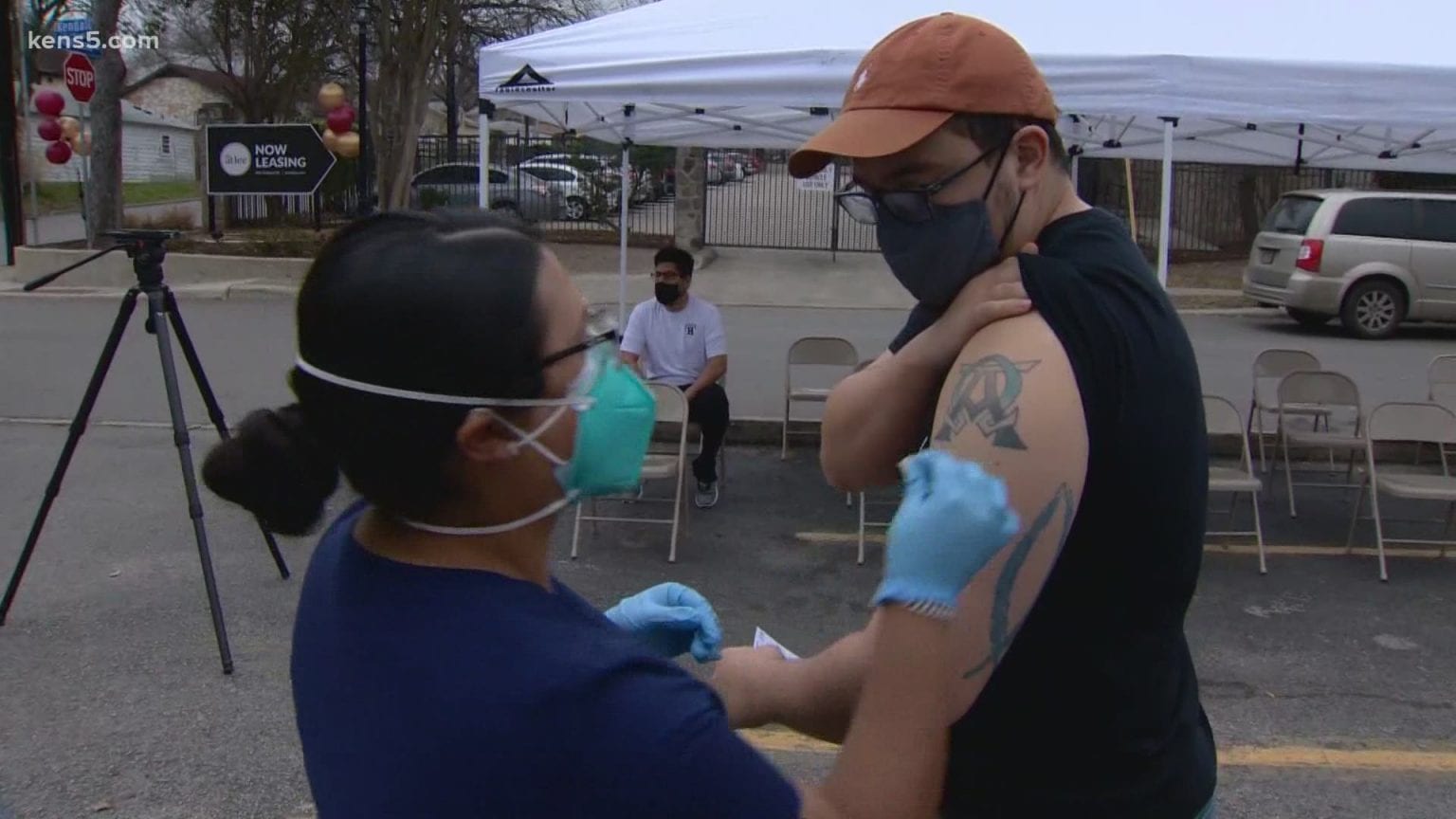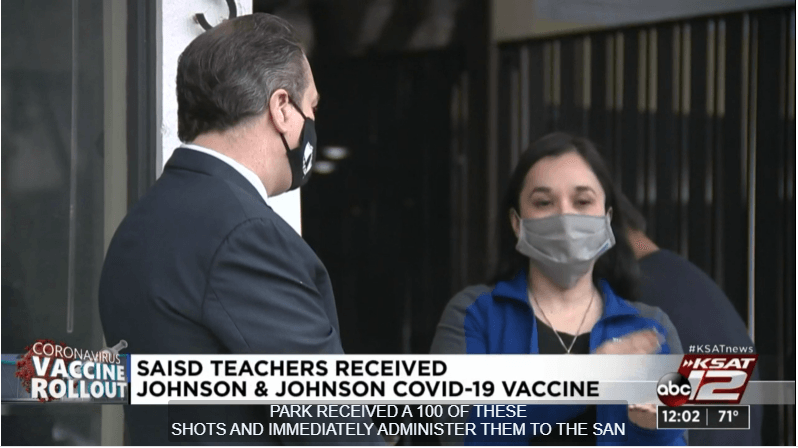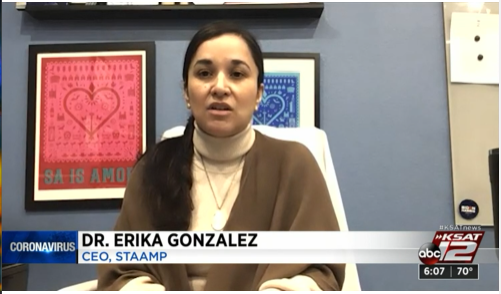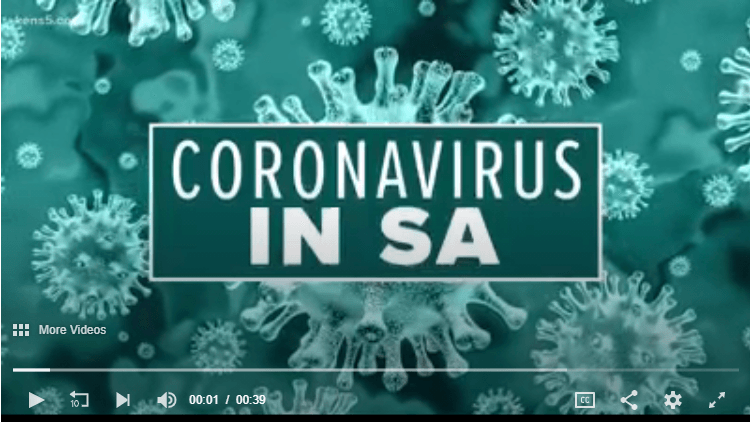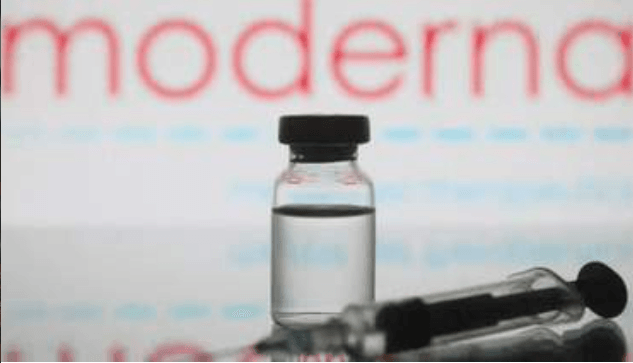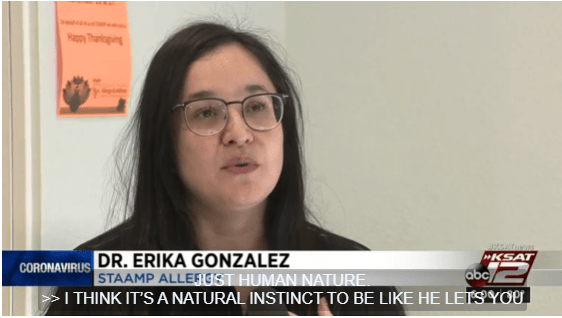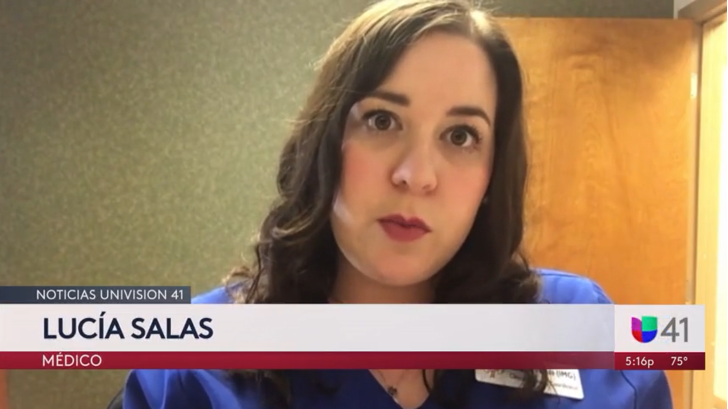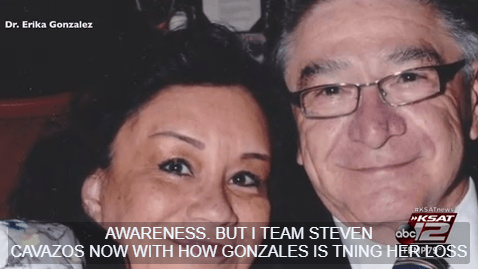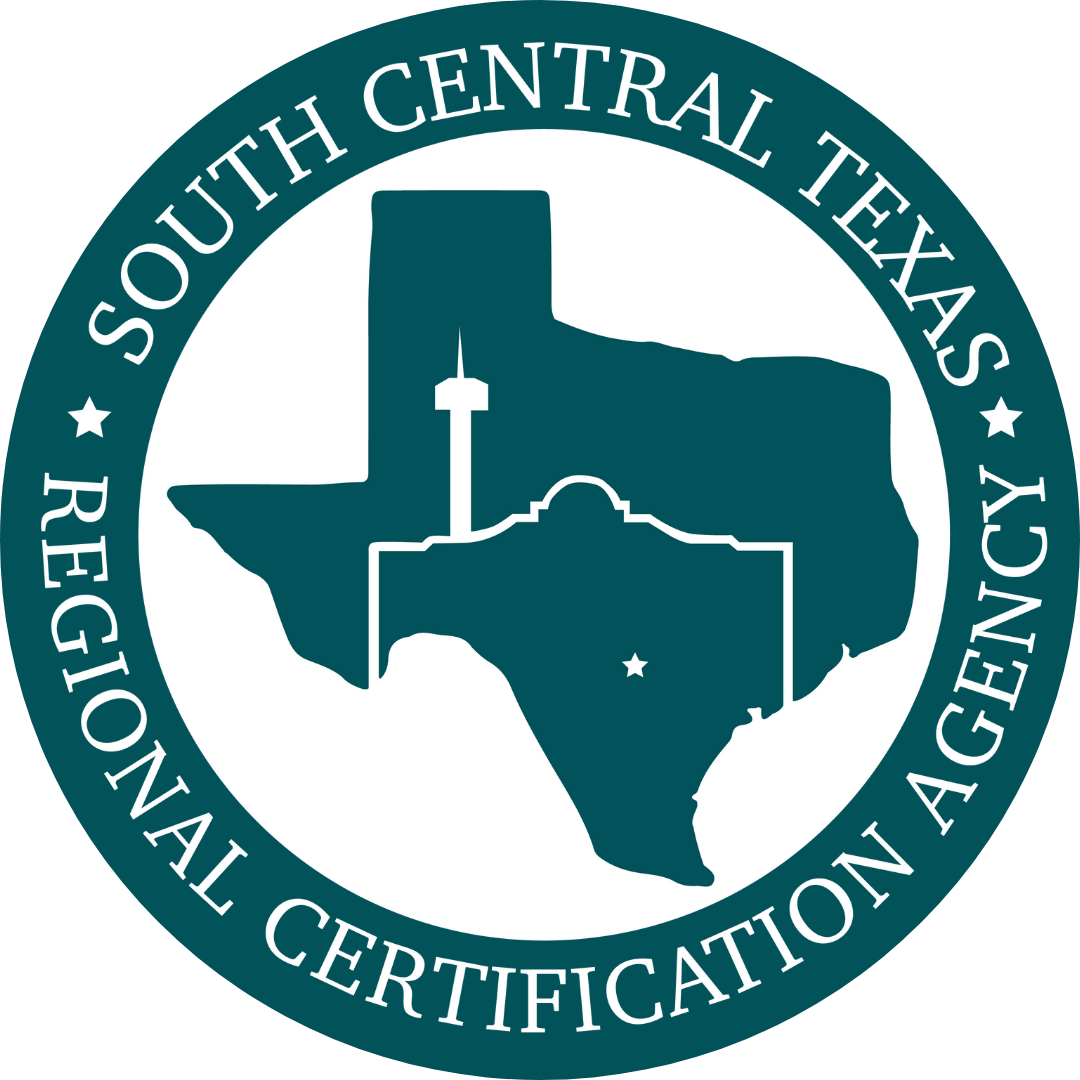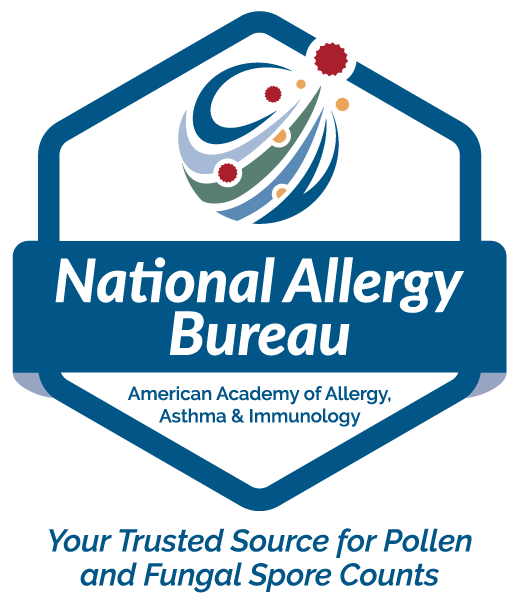STAAMP Allergy
In the News
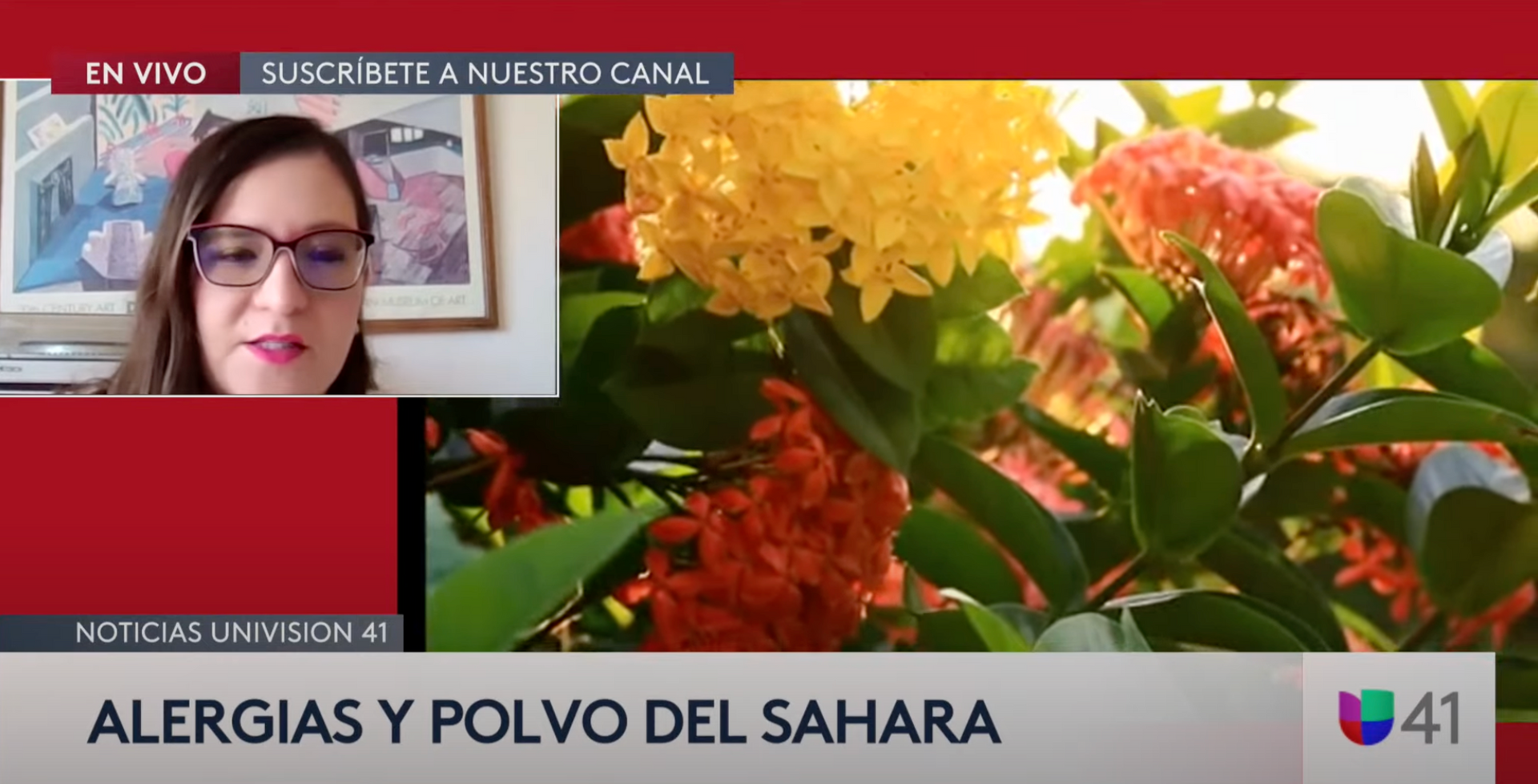
Univision 41 San Antonio es el espacio digital de noticias para que los residentes de la comunidad hispana en la entidad encuentren información útil que les ayude a vivir en los Estados Unidos. Noticias relacionadas con el tiempo, la temperatura, olas de calor, tormentas de arena, granizadas, así como temas de migración, deportaciones, política, resultados de la lotería, economía, negocios, finanzas personales, educación, salud, crimen, tráfico y la guía local son algunos de los tópicos que el grupo de periodistas reportean para la audiencia local.
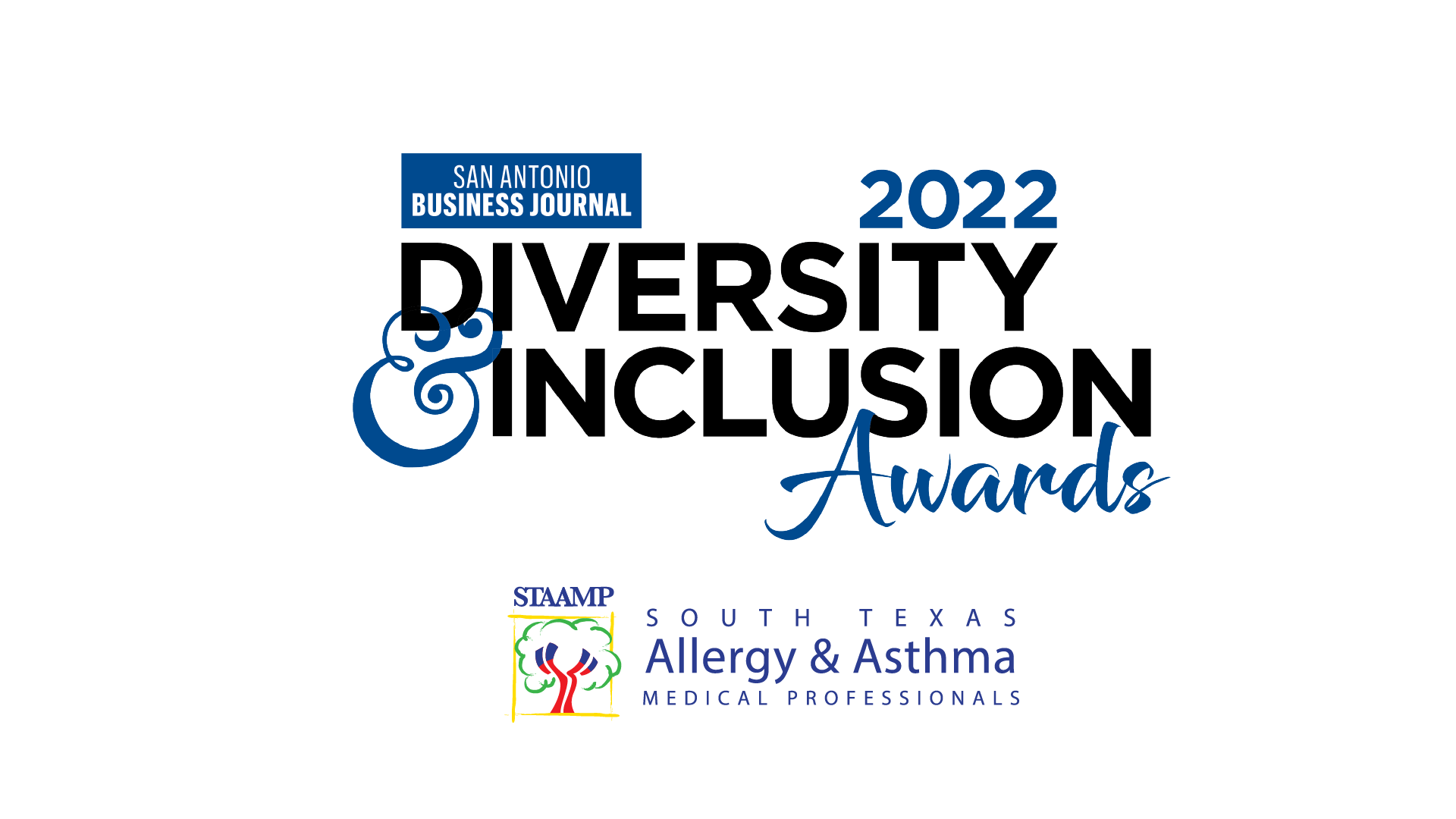
The winning companies are working to ensure diversity, equity and inclusion are priorities, not only for their companies but for their clients. Moves that impressed the judges included diversity in top leadership positions, health care benefits for nontraditional families and unconscious bias training.
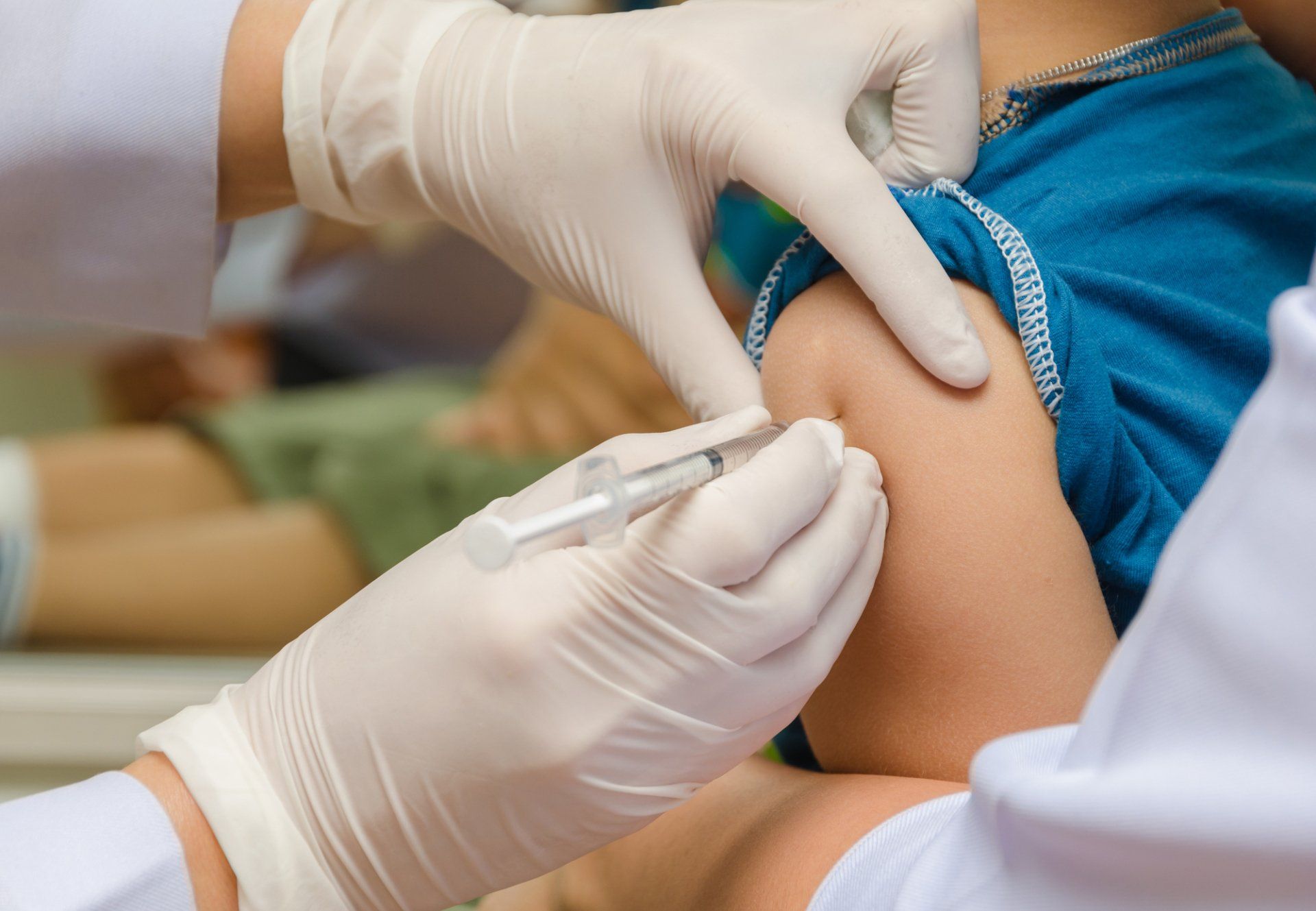
Families across San Antonio and the nation have been eagerly awaiting news from the CDC and FDA for when COVID-19 vaccines will be given the green light for their children under the age of 5. South Texas Allergy & Asthma Medical Professionals (STAAMP) has been steadily tracking this progress and is hopeful to see this happen in the near future.
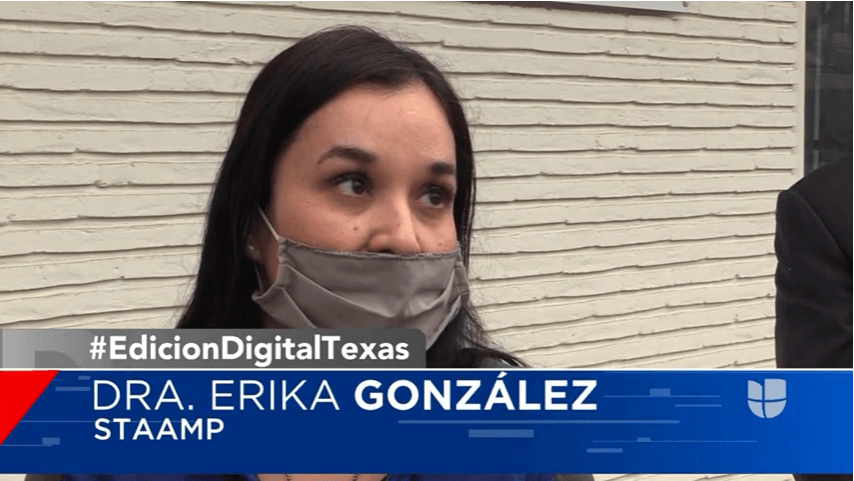
This story was originally published by Univision – KWEX 41 and can be found here . Cien maestros y empleados del distrito recibieron este martes la vacuna contra el coronavirus de la empresa Johnson & Johnson. Estas personas fueron seleccionadas ya q ue trabajarán durante el periodo de ‘spring break’. Mira el video aquí
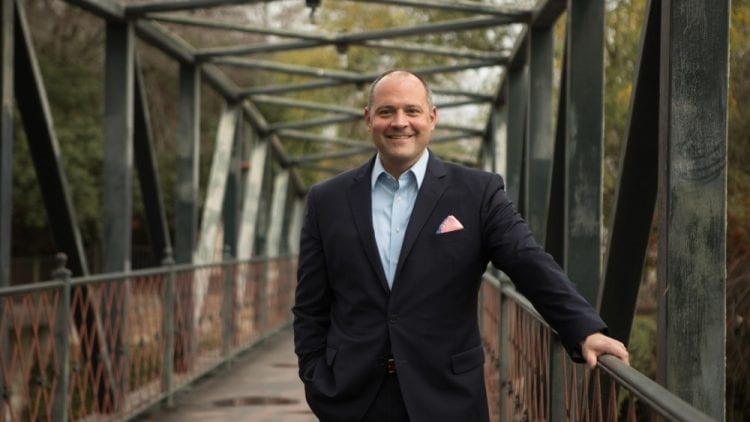
This story was originally published by San Antonio Report and can be found here . The turning of the calendar brought a turn in leadership to the San Antonio Report’s board of directors . A.J. Rodriguez ascended to board chairman late last month, after John “Chico” Newman Jr. stepped down from that position and the board after more than five years. The changes went into effect at the board’s Jan. 25 meeting. Rodriguez joined the board in 2020, after briefly serving on the San Antonio Report’s Board of Community Advisors . Founding Vice Chair Newman, who served as chairman for a year, decided to retire from the board because he believes the organization needs a fresh set of eyes. Newman served on the board since its inception, when the San Antonio Report, founded in 2012, reorganized as a nonprofit in 2016. The change in board leadership comes three months after the board named Angie Mock publisher and CEO of the nonprofit news organization, replacing co-founder Robert Rivard, who continues to serve as editor and lead columnist. Mock previously served as CEO of the Boys & Girls Club of San Antonio and had been a member of the San Antonio Report’s board since 2018. “We are deeply grateful for Chico’s vision, dedication, and passion that led us from a blog to a thriving nonprofit news organization,” Mock said. “Equally, I’m excited about what the future holds with A.J.’s leadership. A.J. brings a wealth of nonprofit success and strategic vision to the San Antonio Report.” Rodriguez joined the nonprofit Texas 2036 in September 2020 as the executive vice president. Texas 2036 is a nonpartisan organization that provides research-based solutions to make Texas a better place for all residents by the state’s bicentennial. Before that, he served as vice president of external affairs and on the executive leadership team of Zachry Group, a privately held construction and engineering business. Rodriguez also served as the deputy city manager for the City of San Antonio from 2008 to 2011. This experience makes Rodriguez the best fit to lead the board of directors as the San Antonio Report continues to evolve, Newman said. “He is the right person at the right time,” Newman said. “You really can’t be any better than the leadership of an organization. With the combination of Angie and A.J., the San Antonio Report has outstanding leadership.” A longtime fan of the San Antonio Report, Rodriguez said he joined the Board of Community Advisors and then the board of directors because he truly believes in the organization’s mission. “I’ve felt compelled to participate in any way I could to support the mission of the organization,” he said. Retired SBC Southwestern Bell President Wayne Alexander is the vice chair and treasurer of the board, while San Antonio Report founder and Editor Rivard serves as secretary. Other board directors include Teach for America Chief People Officer Laura Saldivar Luna, attorney Brian Steward, former Rackspace Community Affairs Director Cara Nichols, and Dr. Erika Gonzalez, CEO, president, and co-founder of South Texas Allergy and Asthma Professionals. Kate Rogers, a longtime H-E-B executive and the former vice president of community outreach and engagement for the Charles Butt Foundation, rounds out the eight-member board. As the new board chairman, Rodriguez said he wants to serve as a resource for the organization, to help grow and develop the San Antonio Report at “an increasingly rapid rate,” and to maintain the high standards of journalism it upholds. He also said he is excited to work with Mock as she carries the organization forward under her leadership. “There’s nowhere to go but up,” Rodriguez said. Looking back over the past five years, Newman said he could not agree more. If someone had told him five years ago that the San Antonio Report would be where it is today, he would have said that was “aspirational.” “For a small group, we punch way above our weight,” he said. Newman has watched the organization evolve from just a handful of people to a staff of 20, from a small startup to a professional organization. He said the shifts in leadership are part of the same evolution for the San Antonio Report and will help further its mission to build a more informed community. “We should constantly be learning, evolving, and getting better – and we have,” he said. “The organization has come a long way in five and a half years.”

This story was originally published by San Antonio Report and can be found here . San Antonio Independent School District Superintendent Pedro Martinez is not waiting for the go-ahead from state officials to offer SAISD staff the coronavirus vaccine . Martinez announced earlier this month that the school district planned to offer the vaccine to employees who qualify to receive it under state guidelines, such as people over age 65 and those with certain chronic medical conditions. San Antonio ISD has paired with South Texas Allergy & Asthma Medical Professionals (STAAMP) to offer the vaccine at Alamo Stadium, district spokeswoman Laura Short said Wednesday. Edgewood Independent School District announced Thursday that it has partnered with University Health System to provide COVID-19 vaccines to 100 teachers at the Wonderland Mall of the Americas on Tuesday, according to a press release. The teachers qualify to receive a vaccine under state guidelines. Superintendent Eduardo Hernández said in a statement that EISD has been striving to offer teachers the vaccines. “We deeply value our EISD teachers who have had to transition and adjust so frequently to new teaching methods during this pandemic,” he said. “I’m glad we can start with 100 and hope to bring more vaccines to our staff and community.” No firm date has been set for when SAISD will be able to offer COVID-19 vaccines, but the district is talking to several health care industry partners, including STAAMP, to coordinate staff vaccinations, Short said. STAAMP also is working with other area school districts to offer the vaccine. “We are working on a strategic plan to manage the rollout, including a registration process that allows prioritized SAISD employees to sign up and receive the time and date of their vaccine administration,” she said. “We will focus on providing the vaccinations on weekends.” The school district will start offering vaccines to all educators after the employees who qualify to receive the vaccine under state guidelines have been inoculated, Short said. During a virtual staff town hall Tuesday, Martinez said he expects the vaccine supply to “ramp up” in the coming weeks. He wants the school district to be prepared for when that happens. “We know that your work is essential, and you’ve done an amazing job of keeping our children safe, keeping our schools safe,” he said to staff members. “We owe it to you to do right by you and to keep you safe.” Martinez and other area superintendents have advocated for the state to add teachers and other school staff to its list of first-tier priority groups so they can receive the COVID-19 vaccine as soon as possible. Many school boards have adopted resolutions calling for the same, including Northside, Judson, and Southwest ISDs’ school boards. Texas’ Expert Vaccine Allocation Panel identified who should receive the coronavirus vaccine first to protect the most vulnerable populations and vital resources, according to the Department of State Health Services website. The panel decided health care workers, frontline workers at greater risk of getting COVID-19 such as emergency medical service providers and others who transport patients to hospitals, adults 65 and older, and chronically ill people who are more likely to contract the disease and die from it should receive the first doses of the vaccine. The only school staff included in the first round of people to receive the vaccine were school nurses. They are listed alongside outpatient physicians and nurses, pharmacy staff, medical examiners, and morticians. Some SAISD school nurses have been vaccinated, Martinez said. DSHS expects the vaccine to be available in the spring to people who don’t fall into the established parameters, according to its website. A department spokeswoman said roughly 8 million Texans are eligible to receive the vaccine. The next group has not yet been determ ined by the expert panel. Disclosure: South Texas Allergy & Asthma Medical Professionals is a San Antonio Report business member. Dr. Erika Gonzalez, who practices at STAAMP, sits on the San Antonio Report board of directors.
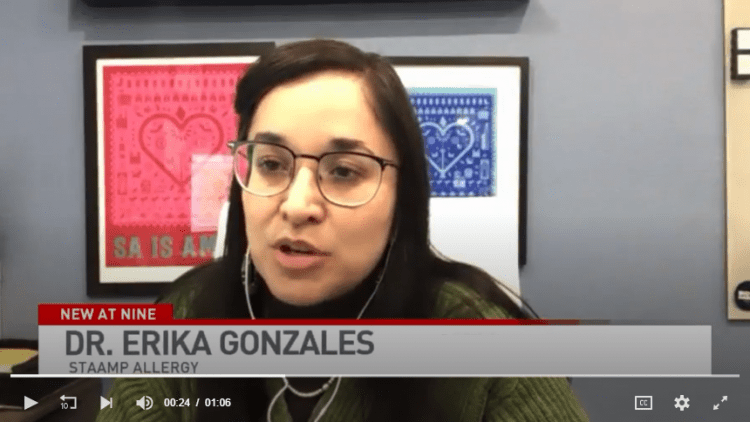
This story was originally published by Fox29 and can be found here . SAN ANTONIO- If you are sniffling a lot right now, mountain cedar might just be the culprit. The season lasts until about February. Doctors are reminding you to monitor how you are feeling and they have one way you can tell COVID and allergies symptoms apart. “If you have a fever, that’s pretty much a tell tell sign that it’s not allergies. Alle rgies do not give you a fever, so if you have a fever you should really be thinking this may be COVID or another virus. If there is a lot of itching: itchy noise, itchy eyes, that’s very commonly associated with allergies,” said Dr. Erika Gonzales of Staamp Allergy. Watch Video Here
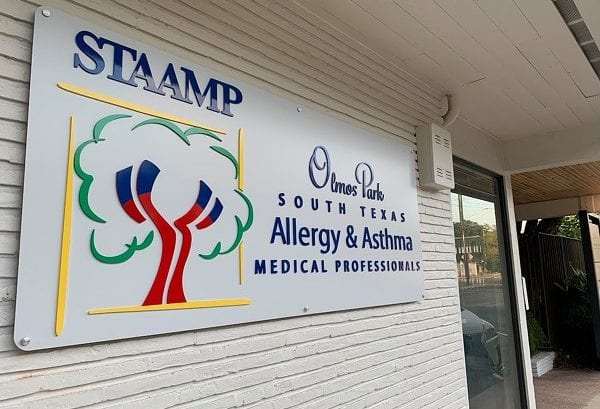
This story was originally published by SA Current and can be found here . A San Antonio allergy center is one of six U.S. research clinics offering free trial medication that may mitigate the lethal impacts of COVID-19. South Texas Allergy and Asthma Medical Professionals (STAAMP) is offering offering brand name anticoagulant Xarelto for free to patients who test positive for coronavirus and have an underlying risk factor, KSAT reports . The medication, provided through the Bill and Melinda Gates Research Institute, could be useful in stopping deadly blood clots, according to STAAMP President and CEO Dr. Erika Gonzalez. “We know from the beginning that [COVID-19] is an inflammatory disease,” Gonzalez said in an interview with the TV station. “One of the things that it does in the process is increase the risk of clotting.” Fighting the deadly affects of COVID-19 moved beyond a professional pursuit after Gonzalez’s mother died from the coronavirus at age 69, seemingly healthy and with no underlying health conditions, KSAT reports. “Especially seeing how it affected my family and how quickly my mom got sick and unfortunately passed away from that, I always feel like it’s better to err on the side of being conservative,” she said. By treating people early with Xarelto, Gonzalez told the station she hopes they can avoid hospitalization. Patients who meet the criteria can call STAAMP at (210) 980-7711 to participate. Those who qualify will receive a telemedicine exam. The clinic will send the medication and trial materials to the patient’s home.

This story was originally published by San Antonio Report and can be found here . The San Antonio Report board of directors has elected three new directors. Confirmed during a board meeting on Monday, the three new directors are Dr. Erika Gonzalez, Cara Nichols, and A.J. Rodriguez. They will begin serving at the Oct. 28 board meeting. With the addition of these new members, the San Antonio Report board, which provides oversight of the nonprofit news organization, better reflects the ethnic and gender makeup of the San Antonio community, said board Chairman John “Chico” Newman. “I truly am very excited about these three individuals,” Newman said. “They’re just going to make the board a lot better – just having different perspectives is really important. The better we can be in the boardroom, the better off it is for the organization and for San Antonio.” The additions expand the board to 10 members and follow the Aug. 10 renaming of the San Antonio Report that occurred during its eighth year as a local news source. “The San Antonio Report continues to be my go-to news source for high-quality, timely, well-researched, thorough local updates on important community activity,” said Rodriguez, who is executive vice president of the nonprofit think tank Texas 2036 . “I’m thrilled to participate on the board to support the publication’s ongoing growth and commitment to excellent service for our readers.” Prior to his recent appointment at Texas 2036, Rodriguez was vice president of external affairs at the San Antonio-based Zachry Group . A former director of community affairs for Rackspace Technology , Nichols said the San Antonio Report continues to lead the way in creating an informed citizenry with integrity, relevance, and credibility. “I am honored to join the board of such an outstanding organization and to continue to advocate for San Antonians to be aware of, and take an active role in, our city’s progress,” she said. Nichols serves on the board of the employee-funded Rackspace Foundation and previously served as editor of a high-end lifestyle magazine, C San Antonio. She is currently writing a book. A physician and 2020 chairwoman of the San Antonio Hispanic Chamber of Commerce , Gonzalez said she is joining the board during a time when people are looking in many places for news and information, especially during the coronavirus pandemic. “The San Antonio Report’s nonprofit approach to news is helping our community receive their news in an equitable way,” Gonzalez said. “I am excited to join the board of directors for a news source that has earned the respect of San Antonians.” Newman, an investor and president of the John and Florence Newman Family Foundation, began his term as chairman of the board in February. He succeeded founding Chairman Richard “Dick” T. Schlosberg III, who is now chairman of the San Antonio Report’s Board of Community Advisors , an advisory group of 20 nonvoting members established in July . Newman said the significant changes happening within the organization in the last year have been in the works long before now. “It just so happens it’s all coming together right about now,” he said. “The steps we’re taking now will make us successful and sustainable in the future – that’s the game plan.” Retired AT&T executive Wayne Alexander is vice chairman of the board, and other board officers include treasurer Angie Mock, president and CEO of the Boys and Girls Club of San Antonio, and Robert Rivard, the San Antonio Report’s publisher and editor who serves as the board’s secretary. “The addition of these three outstanding community leaders will give the San Antonio Report a more diverse and representative board of directors,” Rivard said Monday. Rounding out the San Antonio Report board are Kate Rogers, vice president of community outreach and engagement for the Charles Butt Foundation; Laura Saldivar Luna, chief people officer for Teach for America; and trial attorney Brian Steward. Board members serve for three years with the opportunity to renew for a second three-year term. The San Antonio Report, founded in 2012 as the Rivard Report, reorganized as a 501(c)(3) nonprofit in 2015.

This story was originally published by San Antonio Report and can be found here . City policing, access to health equity, and the future of San Antonio drive Friday’s conversations on San Antonio CityFest’s final day of civi c engagement events. The third annual San Antonio CityFest, a virtual urban ideas festival, runs through Friday. Its weeklong lineup of events, panel discussions, and entertainment features an array of topics including public health, business and job growth, transportation and development, and recovery from the economic and health crisis of the coronavirus pandemic. All CityFest 2020 programming is free and open to the public, with pre-registration required . Once attendees are registered they will receive an email giving them access to the festival web app. Registered attendees are also invited to download the Whova app for more opportunities to network, ask the panelists questions, and take the festival anywhere they go. 10 a.m. San Antonio Report Senior Reporter Iris Dimmick speaks with Elizabeth Provencio, the City of San Antonio’s first assistant city attorney; Michael R. Smith, criminal justice professor at the University of Texas at San Antonio; Oji Martin, founder of Fix SAPD; and Mike Helle, president of the San Antonio Police Officers Association, for a panel on “ Policing in San Antonio. “ 11 a.m. San Antonio Poet Laureate Andrea “Vocab” Sanderson” and The Foreign Arm come together for a lively poetic performance , followed by a conversation with San Antonio Report Arts and Culture Reporter Nicholas Frank on the inspiration behind their work. Noon A panel on “ Health Equity in South Texas ” where city leaders and health professionals discuss the community’s joint effort to provide equitable access to health care. San Antonio Report Managing Editor Graham Watson-Ringo is joined by Dr. Somava Saha, Well Being In the Nation Network executive lead; Dr. Colleen Bridger, City of San Antonio assistant city manager; Dr. Erika Gonzalez, South Texas Allergy & Asthma Medical Professionals president and CEO; and Jaime Wesolowski, Methodist Healthcare Ministries president and CEO. 2:30 p.m. San Antonio Report Photo Editor Scott Ball and staff photographer Bonnie Arbittier will co-moderate “ Photojournalism During a Public Health Crisis ” – a discussion with Bria Woods, executive producer at KAVU-TV in Victoria, and photographer Chris Lee about how the pandemic has prompted new ways of documenting current events. 3:30 p.m. For the final event of San Antonio CityFest, San Antonio Report Editor and Publisher Robert Rivard moderates a conversation with city leaders in “ Future of the City .” Panelists include Brian Dillard, City of San Antonio chief innovation officer; John Burnam, Burnam | Gray co-founder and principal; Ximena Alvarez, U.S. Census Bureau media specialist; Jenna Saucedo-Herrera, San Antonio Economic Development Foundation president and chief executive officer; and Alex Birnel, MOVE Texas advocacy manager. The full schedule is available here .
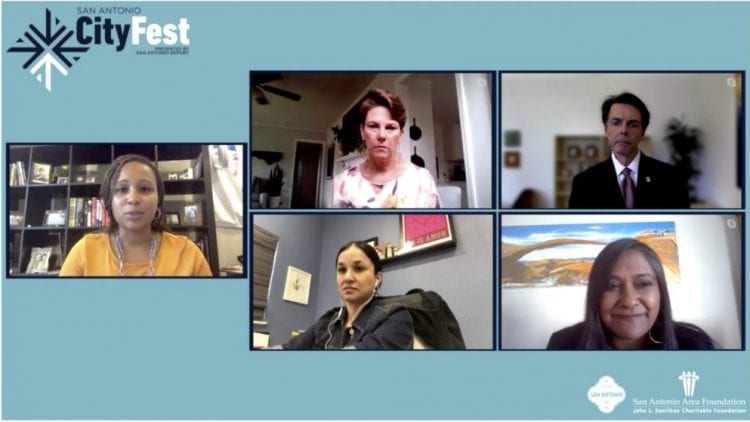
This story was originally published by San Antonio Report and can be found here . Take a 1930s map of San Antonio’s redlined communities – used to avoid “hazardous” loans in Black and Hispanic neighborhoods – and compare it with a map of families currently living below the poverty level and coronavirus cases. A disturbing pattern emerges: structural racism in action. Across the country, communities of color have been disproportionally impacted by the coronavirus pandemic in terms of economic and health outcomes, said Dr. Somava Saha, executive lead of Well Being in the Nation Network . “If you look at those places, what you’ll see is that they lack the underlying conditions of [a successful] place,” such as a clean environment, healthy food, and access to health care. Depending on how communities handle the pandemic, Saha said, “this is either a moment where we are going to erase those red lines or … we’re creating the future redlining maps. … That’s the charge for all of us in this moment in history, is to think about how we use this moment to ‘greenline’ the areas that have been redlined.” The City of San Antonio’s response and recovery plan is aimed at erasing those lines, said Colleen Bridger, assistant city manager and interim director of Metropolitan Health District. “Literally everything we’re doing is steeped in a focus on equity. … I love calling it greenlining.” Saha and Bridger spoke during a panel discussion on Friday as part of the San Antonio Report’s five-day urban ideas festival CityFest. They were joined by Erika Gonzalez, president and CEO of South Texas Allergy & Asthma Medical Professionals, and Jaime Wesolowski, president and CEO of Methodist Healthcare Ministries of South Texas, to discuss Saha’s keynote address on health equity and possible paths forward. Saha, who is a primary care doctor and public health practitioner, likened public health to a fire. “We [could be] the best-organized bucket brigade trying to put out a fire, [but] there is a tanker full of gasoline going into the fire at the same time,” Saha said. Similarly, doctors typically address the patient in front of them but not the underlying cause of the illness, she added. “What would it take for us to strategically shift those underlying things in the environment that are driving poor outcomes?”
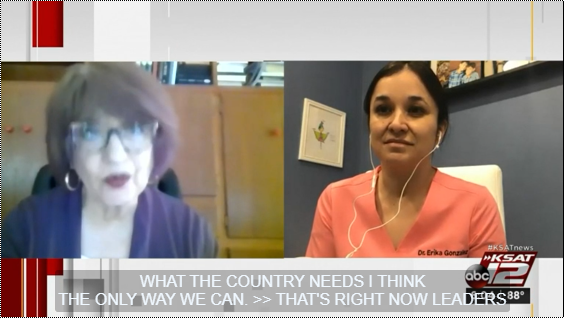
President Trump’s COVID-19 Comments Draw Reaction from San Antonio Coronavirus Survivors, Loved Ones
‘It’s careless to put it mildly,’ says daughter who lost her mother .
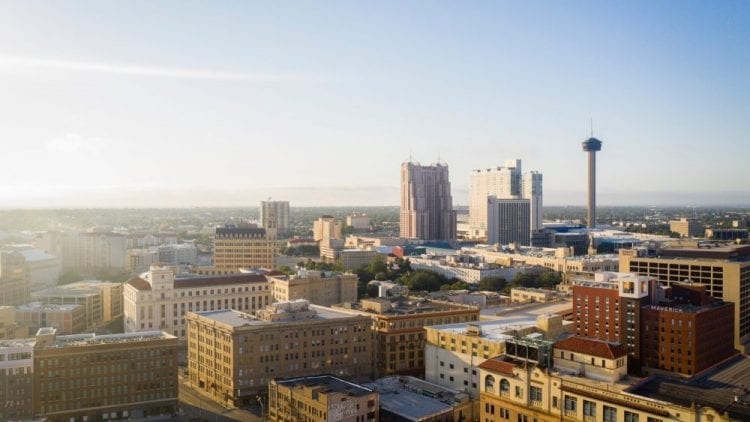
This story was originally published by San Antonio Report and can be found here . The turning of the calendar brought a turn in leadership to the San Antonio Report’s board of directors . A.J. Rodriguez ascended to board chairman late last month, after John “Chico” Newman Jr. stepped down from that position and the board after more than five years. The changes went into effect at the board’s Jan. 25 meeting. Rodriguez joined the board in 2020, after briefly serving on the San Antonio Report’s Board of Community Advisors . Founding Vice Chair Newman, who served as chairman for a year, decided to retire from the board because he believes the organization needs a fresh set of eyes. Newman served on the board since its inception, when the San Antonio Report, founded in 2012, reorganized as a nonprofit in 2016. The change in board leadership comes three months after the board named Angie Mock publisher and CEO of the nonprofit news organization, replacing co-founder Robert Rivard, who continues to serve as editor and lead columnist. Mock previously served as CEO of the Boys & Girls Club of San Antonio and had been a member of the San Antonio Report’s board since 2018. “We are deeply grateful for Chico’s vision, dedication, and passion that led us from a blog to a thriving nonprofit news organization,” Mock said. “Equally, I’m excited about what the future holds with A.J.’s leadership. A.J. brings a wealth of nonprofit success and strategic vision to the San Antonio Report.” Rodriguez joined the nonprofit Texas 2036 in September 2020 as the executive vice president. Texas 2036 is a nonpartisan organization that provides research-based solutions to make Texas a better place for all residents by the state’s bicentennial. Before that, he served as vice president of external affairs and on the executive leadership team of Zachry Group, a privately held construction and engineering business. Rodriguez also served as the deputy city manager for the City of San Antonio from 2008 to 2011. This experience makes Rodriguez the best fit to lead the board of directors as the San Antonio Report continues to evolve, Newman said. “He is the right person at the right time,” Newman said. “You really can’t be any better than the leadership of an organization. With the combination of Angie and A.J., the San Antonio Report has outstanding leadership.” A longtime fan of the San Antonio Report, Rodriguez said he joined the Board of Community Advisors and then the board of directors because he truly believes in the organization’s mission. “I’ve felt compelled to participate in any way I could to support the mission of the organization,” he said. Retired SBC Southwestern Bell President Wayne Alexander is the vice chair and treasurer of the board, while San Antonio Report founder and Editor Rivard serves as secretary. Other board directors include Teach for America Chief People Officer Laura Saldivar Luna, attorney Brian Steward, former Rackspace Community Affairs Director Cara Nichols, and Dr. Erika Gonzalez, CEO, president, and co-founder of South Texas Allergy and Asthma Professionals. Kate Rogers, a longtime H-E-B executive and the former vice president of community outreach and engagement for the Charles Butt Foundation, rounds out the eight-member board. As the new board chairman, Rodriguez said he wants to serve as a resource for the organization, to help grow and develop the San Antonio Report at “an increasingly rapid rate,” and to maintain the high standards of journalism it upholds. He also said he is excited to work with Mock as she carries the organization forward under her leadership. “There’s nowhere to go but up,” Rodriguez said. Looking back over the past five years, Newman said he could not agree more. If someone had told him five years ago that the San Antonio Report would be where it is today, he would have said that was “aspirational.” “For a small group, we punch way above our weight,” he said. Newman has watched the organization evolve from just a handful of people to a staff of 20, from a small startup to a professional organization. He said the shifts in leadership are part of the same evolution for the San Antonio Report and will help further its mission to build a more informed community. “We should constantly be learning, evolving, and getting better – and we have,” he said. “The organization has come a long way in five and a half years.”
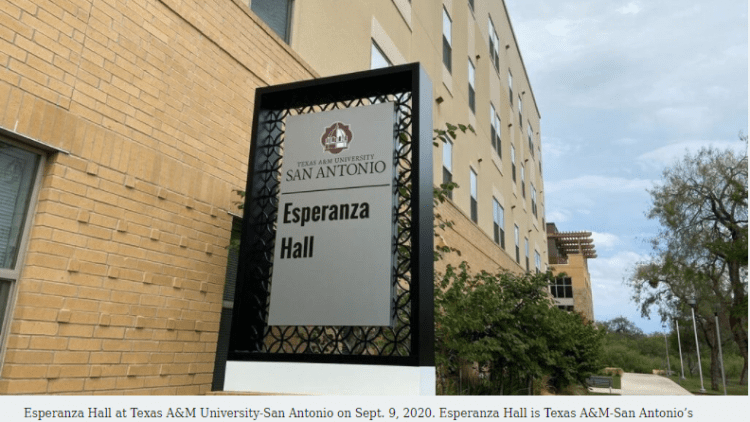
This story was originally published by The Mesquite (TAMUSA) and can be found here . Students living at Texas A&M University-San Antonio will receive monthly COVID-19 tests. Provided by the A&M System, 700 tests per month will be administered without cost to Esperanza Hall dorm residents. Located in portable 101B behind the Central Academic Building and open from 9 a.m. to 1 p.m. Monday – Friday, the administering of tests is overseen by STAAMP Allergy, a local service provider, while Curative Inc., a Los Angeles national testing company, provides confidential results. According to Dr. Mari Fuentes-Martin, vice president of Student Success and Engagement, with over 100 dorm residents tested, the decision to require monthly tests was made the final week of August starting the 26th after the number of COVID-19 tests provided to the university was verified the second week of school. The university wasn’t sure of how severe COVID-19 was going to be or how many tests they were being provided when school opened up. Fuentes-Martin said because of this uncertainty, wellness stations were set up to take the temperatures of new residents moving in. “The reason we’re very interested in that population is that they spend 24/7 together, unlike a classroom,” Fuentes-Martin said. “…You’re just in such close proximity to each other for a very extended amount of time, so we wanted to be extraordinarily careful.” Though there have been zero positive cases among dorm residents, the university already has accommodations in place for Esperanza Hall residents who test positive. Positive residents will be moved to an isolated apartment and asked to quarantine in place, while those potentially exposed to them are tested and quarantined for at least 48 hours. Fuentes-Martin says A&M-San Antonio’s main goal is to provide the safest environment possible through preventative measures. To develop these measures, A&M-San Antonio partnered with American Campus Communities, the operators of Esperanza Hall, to find the best way to approach the situation. “We looked at their safety protocols, we looked at their signage, and we were able to blend a lot of those things and expectations that we had for safety with what they also had,” Fuentes-Martin said. Education freshman Paige Borenheim started living in the dorms at the beginning of the fall 2020 semester and is witnessing the effects of COVID-19 on Esperanza Hall firsthand. Masks are needed on short trips outside rooms and visitors aren’t allowed; doorknobs and handrails are cleaned systematically and elevators have limited capacity. While Borenheim has a roommate, she says most dorm residents don’t because many potential residents canceled their plans to move in. “I know a lot of people who have no one to hang out with or they’re kind of just actually isolated with no one,” Borenheim said. Along with these changes comes the monthly COVID-19 testing requirement. “I have mixed feelings on it because obviously it takes a lot out of your day to go get tested,” Borenheim said. “I got tested a week ago, and they sent us an email the day before we had to get tested like, ‘by the way, you have to get tested every month.’ So there was a long line of 30-plus people in the hot sun for an hour plus.” Borenheim says she now has conflicting feelings about how the process is currently being handled. “I do like it,” Borenheim said. ”I know they’re trying to make sure no one’s contracting the virus or anything but at the same time it’s kind of like, I wish there was a better way to go on with it.” Fuentes-Martin said she wants students to know that A&M–San Antonio is adapting and that the university has services to help deal with COVID-19 which can be found at https://www.tamusa.edu/community-safety-together/index.html “If you need a laptop, or if you need Wi-Fi…The library’s open, advising is open, you know, so we’re here to help students,” Fuentes-Martin said. “We don’t want you all to think that we’re invisibly not here. We are here.” This story was updated at 5:49 p.m. Sept. 11 to correct “Stamp” to “STAAMP Allergy” and to explain that Curative Inc. provides confidential results.
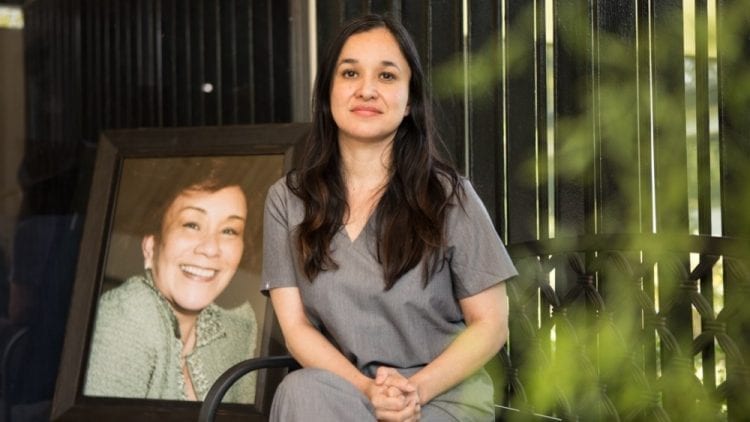
This story was originally published by San Antonio Report and can be found here . Dr. Erika Gonzalez is a mother and a military veteran, a community leader on the rise, a practitioner in and owner of an allergy practice with three locations in San Antonio. But the coronavirus outbreak has proved unsparing and, on Wednesday, Gonzalez will join her two sisters in reciting the rosary before laying to rest their mother, Laura Gonzalez, who died Aug. 13 from complications of COVID-19. She was 69. Her death came despite the precautions she took to keep from contracting the virus and efforts by her physician daughter, her family, and the doctors to save her. Having connections to the medical community and knowledge of the health care system were not enough. “You can bet that we did everything we could, no stone left unturned, no connection that I didn’t try to use,” Gonzalez said. “We were powerless.” Now Gonzalez is keeping a watchful eye on her 80-year-old father, Heriberto, who is still hospitalized with the virus but appears to be recovering. The couple fell ill within days of one another in mid-July. Unlike many victims of the virus, Laura’s symptoms did not include fever, a cough, body aches, or shortness of breath – the most common signs of coronavirus. Only when she couldn’t eat due to persistent nausea and vomiting – and Laura’s daughters worried their mother could become dehydrated – was she diagnosed and hospitalized. By then, her blood oxygen levels were dangerously low even though she was not complaining of shortness of breath. Heriberto’s hospitalization followed a day later. Within the week, the Centers for Disease Control and Prevention added nausea and vomiting to the list of coronavirus symptoms, Gonzalez said. Remembering a mother Gonzalez describes Laura as the strongest woman she knows. As a young wife and mother who learned English watching daytime TV, Laura returned briefly to her home in Mexico to attend dental school, then rejoined her husband in the U.S. and started her own practice in a border town. “I have great memories of going to work with my mom,” Gonzalez said of those years in which the seeds of her own medical career were planted. But Laura was also devoted to her son with special needs and other medical conditions who required extra care and attention. “Not until I became a mom did I fully realize how hard that must have been to take care of a child with special needs and three other young girls and own a small business,” Gonzalez said. “It’s unbelievable to me, honestly.” In Laura’s later years, following retirement and the death of their son, she took advantage of every day, especially to travel, Gonzalez said. “She lived it to the fullest and never let anything slow her down.” But when the coronavirus outbreak began in March, Laura and Heriberto sheltered at home, only venturing out to the grocery store. Gonzalez doesn’t know how her parents contracted the virus. Family advocates Laura’s first coronavirus test came back negative but it soon became obvious she needed to be hospitalized. “Like any other family, my two sisters and I were doing our best to advocate for my parents,” Gonzalez said. “We were in touch with all their physicians either because we knew them personally or knew someone who knew them.” After her mother was intubated and put on a ventilator, the sisters decided to transfer the couple from a private hospital to Brooke Army Medical Center (BAMC). They hoped Laura could receive extracorporeal membrane oxygenation (ECMO) treatment at BAMC, one of only two local hospitals equipped for such care. The hospital was also a familiar place for them. Gonzalez had done her fellowship training at BAMC and her sister would soon be working there as a specialty surgeon. It felt like home, she said, and Heriberto, as a veteran and one of the first physician assistants to be trained in the Air Force, and his wife were eligible to receive treatment at BAMC. “It turned out to be one of the best things we did for them,” she said, though Laura’s condition deteriorated before she was able to receive ECMO treatment. But as her mother faded, the hospital allowed Gonzalez the chance to be with her mom in her final hours – an opportunity she doesn’t take for granted, since many family members have not been permitted to be present as their loved ones died. Using her voice A former military physician and now community leader as chairwoman of the San Antonio Hispanic Chamber of Commerce , Gonzalez hopes she can help military medical facilities pioneer a solution that allows families like hers to be with their loved ones dying of the virus. “Because we all know that if we’re taking proper precautions that the risk is a lot lower, and I think in situations like that it will just prevent a lot of mental anguish that some of these families go through,” she said. The pandemic also accelerated her plans for a nonprofit she founded in April. Months before her own parents fell ill, she established Con Corazón San Antonio , an organization that will work to address health inequity and emergency preparedness in underprivileged communities. Due to the pandemic, the first initiative of Con Corazón is raising awareness about the importance of donating convalescent plasma to help others recover from illnesses such as COVID-19. While her mother was able to receive plasma therapy, Gonzalez believes it could have improved her chances if she’d had it sooner. “We’re hoping to turn a very tragic moment in my personal life into hopefully seeing some good come out of it and maybe helping somebody else or another family down the road,” she said. Gonzalez said she chose to serve as the Hispanic chamber’s chairwoman this year to use her voice to support the small business community, especially in health care. “Never in my mind did I ever imagine that it would take on a whole different meaning with this pandemic,” she said. But her platform is now more personal than ever. Despite her grief, she is speaking out now in the hopes she can influence how the community responds to the public health crisis. “People might think that somebody in my position, whether it’s because I’m a doctor, or whether it’s because I’m the chair of the chamber … I can make it better by my knowledge or connections or whatever,” she said. But in this case, she was powerless to change the outcome for her own mother. When Gonzalez saw her mother’s perplexing symptoms worsen, she said she felt as bewildered and fearful of the virus as the rest of the medical community. “How does a virus do what I’m seeing?” she said she thought to herself. “It was a very sobering realization.”
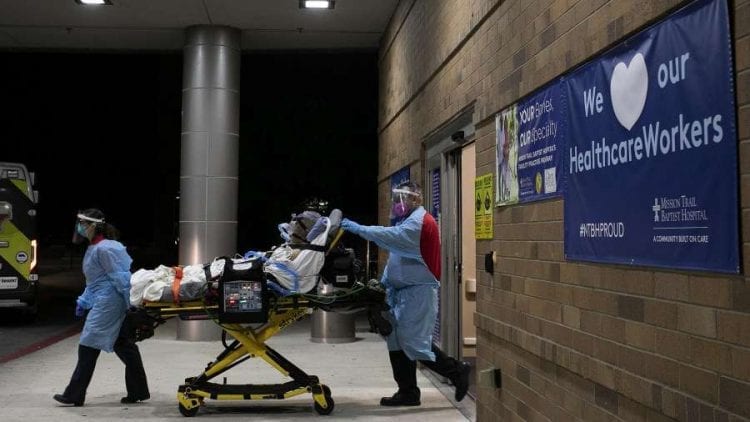
This story was originally published by San Antonio Express News and can be found here . Even City Council members know what it’s like to lose loved ones to the coronavirus. In Councilwoman Adriana Rocha Garcia’s family, six people have died of COVID-19 — all cousins on her father’s side who lived on the West Side. “My dad, he was crying every day for weeks,” said Garcia, who represents District 4 on the Southwest Side, which has one of the city’s highest rates of coronavirus infection. “He thought his whole family was going to pass away.” Garcia’s firsthand experience puts a spotlight on the disproportionate impact the virus has inflicted on the city’s poorest neighborhoods. Nearly half of those who have died of COVID-19 lived on the West and South Sides, parts of town that are overwhelmingly Hispanic, figures shared with the San Antonio Express-News show. Previously, the city had not released data showing deaths by geography. More than a third of the 276 deaths that occurred within city limits as of Aug. 2 were in two council districts: District 3, which covers the Southeast Side, and District 5, which includes parts of the South Side and the heart of the West Side. Neighboring District 4, which covers the Southwest Side, accounts for 11 percent of the city’s deaths.
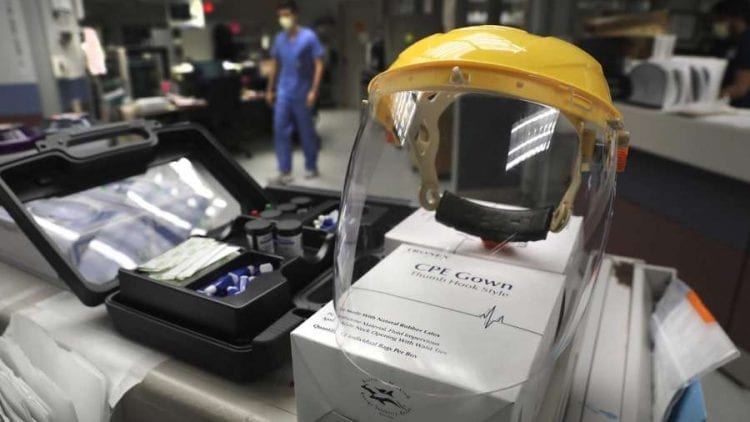
This story was originally published by San Antonio Express News and can be found here . The alarming surge of COVID-19 hospitalizations in San Antonio — where at least one in four new patients has the disease — is growing at a faster rate than in other major Texas cities. For the last week, the number of hospitalized COVID-19 patients in the trauma-care region that includes San Antonio rose by 55 percent, state health department figures show. If the surge continues, it could overload the local health care system in the next week or two.
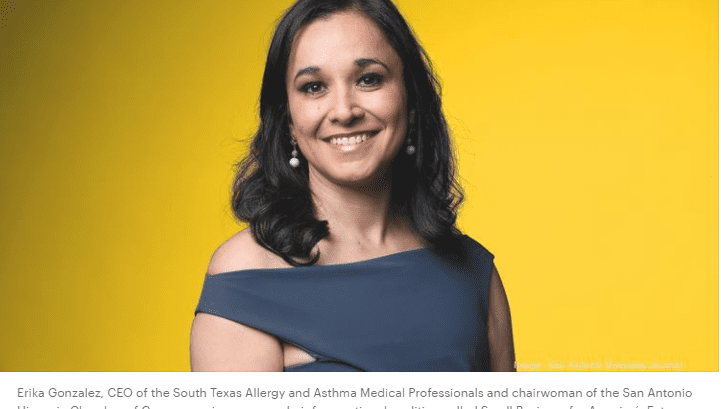
This story was originally published by the San Antonio Business Journal and can be found here . Dr. Erika Gonzalez , chairwoman of the San Antonio Hispanic Chamber of Commerce, was chosen as one of four national co-chairs for the Small Business for America’s Future coalition. The organization, based in Washington, D.C., consists of small business owners and leaders who advocate for policies that facilitate small business growth, while leveling the playing field with big business. The organization asks policymakers to prioritize Main Street businesses by advancing an economic framework and Covid-19 recovery plan for small businesses and their employees. Small Business for America’s Future surveyed more than 1,200 small business owners nationally. Of those surveyed, 84% said they felt leaders favor big business over small business, and 81% of respondents said leaders do not understand the needs of small business. The survey also found that 53% of respondents have incurred new debt related to Covid-19, with nearly 25% of them having new debt of more than $20,000, and 18% with debt over $100,000. The organization is an evolution of the former organization called Businesses for Responsible Tax Reform, which launched in 2017 as an advocate for small businesses during tax reform. It will now focus on three areas of policy reform: health insurance, taxes and economic security. “We’re committed to ensuring policymakers at every level of government prioritize Main Street by advancing an economic framework that benefits both small businesses and our employees,” Gonzalez said. “Reducing the crushing cost of providing health insurance will be important to ensuring small businesses are strong enough financially while maintaining coverage for employees.” The other three co-chairs of the organization include Frank Knapp , president and CEO of the South Carolina Small Business Chamber of Commerce; Anne Zimmerman , owner of Zimmerman and Co. CPAs in Ohio; and Shaundell Newsome , owner of Sumnu Marketing and board chairman for the Urban Chamber of Commerce Las Vegas. The group had been co-chairs for Businesses for Responsible Tax Reform, but wanted to be more geographically and racially diverse, specifically looking to add a Latina as a co-chair, said Gonzalez, who is CEO of the South Texas Allergy and Asthma Medical Professionals PLLC. The organization reached out to the U.S. Hispanic Chamber of Commerce, which recommended Gonzalez. “It lets me represent the Latino businesses nationally,” Gonzalez said. Her Spanish speaking abilities has already enabled her to communicate the organization’s message to bilingual audiences across the nation.
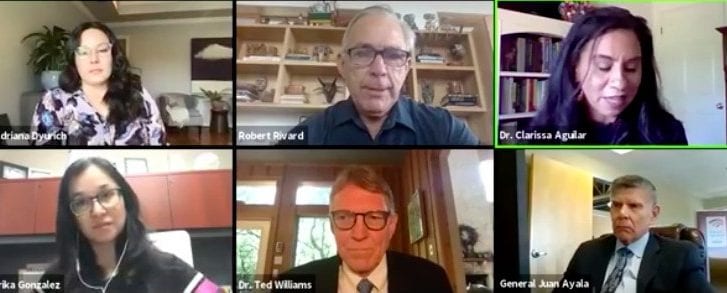
This story was originally published by San Antonio Report and can be found here . Mental health experts encourage small-business owners wrestling with coronavirus-related stress and anxiety to talk openly and honestly about their struggles to cultivate a flexible work environment that can adapt to the needs of the business and its employees. In a webinar hosted by the San Antonio Hispanic Chamber of Commerce (SAHCC) on Thursday, the local experts said a “silver lining” to the coronavirus pandemic is that it highlights the need for people to pay attention to their mental health when they are struggling with heightened or overwhelming emotions. “What we know is that there is a lot of power in acknowledging the struggle,” said Clarissa Aguilar, behavioral health consultant with the Center for Health Care Services, Bexar County’s mental health authority. “Checking in with people if they seem like they need help or resources, and helping people remember the mission and vision, will help keep people connected to the passion that” made the entrepreneurial venture possible. Joining Aguilar in the conversation focused on “normalizing” conversations about mental health and the workplace were Adriana Dyurich, a licensed counselor with UT Health San Antonio, and Dr. Ted Williams, founder of Genesis Psychiatric Center and UT Health San Antonio psychiatry professor. Rivard Report Editor and Publisher Robert Rivard moderated the panel conversation, sponsored by UT Health San Antonio, on the videoconferencing platform Zoom. SAHCC Chairwoman and webinar organizer Dr. Erika Gonzalez said that SAHCC’s health and bioscience committee had planned to spend this year creating a health and wellness program for employees of small businesses that included a strong mental health component, but “when the pandemic occurred, there were more and different mental health issues that arose as small business owners struggled to keep their doors open and people employed,” so the focus shifted to employers. “We were in an existing mental health crisis in our country before the pandemic hit,” Aguilar said, noting “the mental health effects for this pandemic will be longer lasting than the physical health ones.” “The first thing I have done is tried to help my employees understand at least my perspective of the facts,” Williams said. “Fear-driven behavior won’t help us very much.”
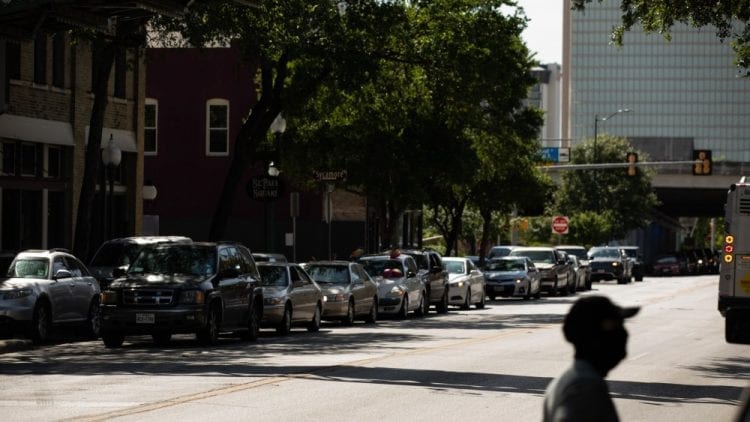
This story was originally published by San Antonio Report and can be found here . In an effort to address the unique challenges small business owners and entrepreneurs have faced during the coronavirus pandemic, the San Antonio Hispanic Chamber of Commerce (SAHCC) is hosting a mental health webinar on Thursday to discuss stress and anxiety in the business community. The goal is to help “normalize the conversation” and empower those in need to reach out for help. “The mental health concerns experienced by [small business owners] and entrepreneurs is something that we have seen” increase over the years, with more people dying by suicide and experiencing crises, SAHCC Chairwoman Dr. Erika Gonzalez said. “When the pandemic occurred, there were more and different mental health issues that arose as small business owners struggled to keep their doors open and people employed.” The COVID-19 Mental Health Webinar, moderated by Rivard Report Editor and Publisher Robert Rivard, will discuss mental health challenges for small business owners, including entrepreneurs with children juggling work and home life demands, stresses and risks involved in owning a small business, and information about available resources for those needing support. Panelists include Clarissa Aguilar, behavioral health consultant with the Center for Health Care Services, Bexar County’s mental health authority, Adriana Dyurich, a licensed counselor with UT Health San Antonio, and Dr. Ted Williams, founder of Genesis Psychiatric Center and UT Health San Antonio psychiatry professor. Dr. Lyssa Ochoa, chair of SAHCC’s healthcare and bioscience committee, said the panelists were selected because of their mental health expertise but also their entrepreneurial experiences that “help give insight and reflection into the stresses of small business ownership.” “How small business leaders have been handling the stress of COVID-19 is something important to talk about because mental health has quite a stigma attached to it, and at the same time, we have the least resources in San Antonio [to address it],” Ochoa said. “If a person had a previous mental health concern, it might be even worse for them now, and we need people to keep checking in on how they are being impacted.” Ochoa said SAHCC’s health and bioscience committee had planned to spend this year creating a health and wellness program for employees of small businesses that included a strong mental health component, but “this pandemic turned everything upside down” and the focus shifted to the employers. The committee is now dedicating that time to discussing how the anxiety and uncertainty already attached to the entrepreneurial experience is exacerbated due to coronavirus, and that it is more important than ever to reach out for help. “As small business owners, we are used to handling stressful situations, but we are trying to make sure we put out there that despite the ability to handle stress, it’s OK if a person needs help,” Ochoa said. The webinar will air on Zoom from 10 a.m. to 11:30 a.m. on Thursday, May 28, and is open to the public free of charge. To register in advance, click here .
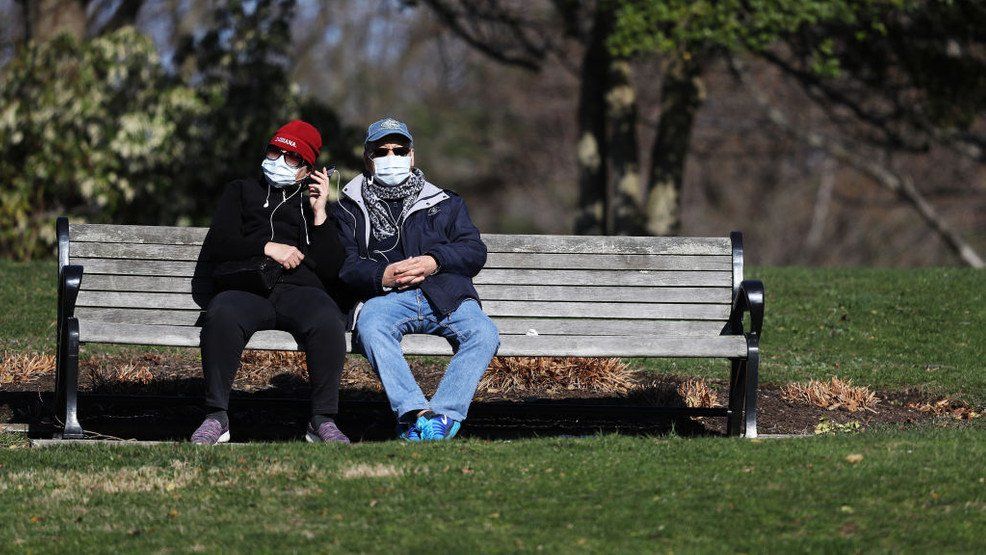
This story was originally published by NEWS4SA and can be found here . San Antonio – A local clinic hopes to get remdisivir, the FDA-approved treatment option for COVID-19, approved for use outside of the hospital setting. “We want to be able to have this treatment available to people as soon as they get sick, so we can actually prevent them from needing to go to the hospital,” said Dr. Erika Gonzalez, CEO of the South Texas Allergy and Asthma Medical Professionals or STAAMP Allergy. Currently, remedisivir is being used as a treatment for COVID-19 patients only in the hospital. “Remdesivir is an antiviral drug, meaning it’s something that specifically fights viruses. We’ve had this around for a long time. Previously, it was used for treatment of Hepatitis C. They used it in Ebola. They also used it when SARS came out. And so we know it works well with some viruses to prevent it from replicating,” Gonzalez said. STAAMP Allergy is conducting a study focused on learning more about remdesivir. The U.S. Food and Drug Administration approved the drug as a treatment for COVID-19 in October. “It’s approved to be used in a hospital, so now they’re trying to get to the approval so that it can be used outside of the hospital setting,” Gonzalez said. Gonzalez said there are about 60 sites across the United States participating in the study. “We’re trying to identify people who have tested positive for coronavirus, who may have some type of risk factor, so that can be anything from obesity, diabetes, high blood pressure, any chronic condition. If you’re older than 60, that already qualifies you as higher risk,” Gonzalez said. The clinical trial is being sponsored by the Bill and Melinda Gates Foundation. Gonzalez said other studies show the drug has been helping patients. “It does reduce the length of either hospitalization stay or treatment progression of symptoms almost by about a week. So we are seeing people, especially if they were intubated, have a shorter amount of periods of requiring to be on the ventilator if they are giving this treatment,” Gonzalez said. The trial is free to patients who participate. Gonzalez said they will monitor people who participate in the study for at least six months. For more information on the study, click here .
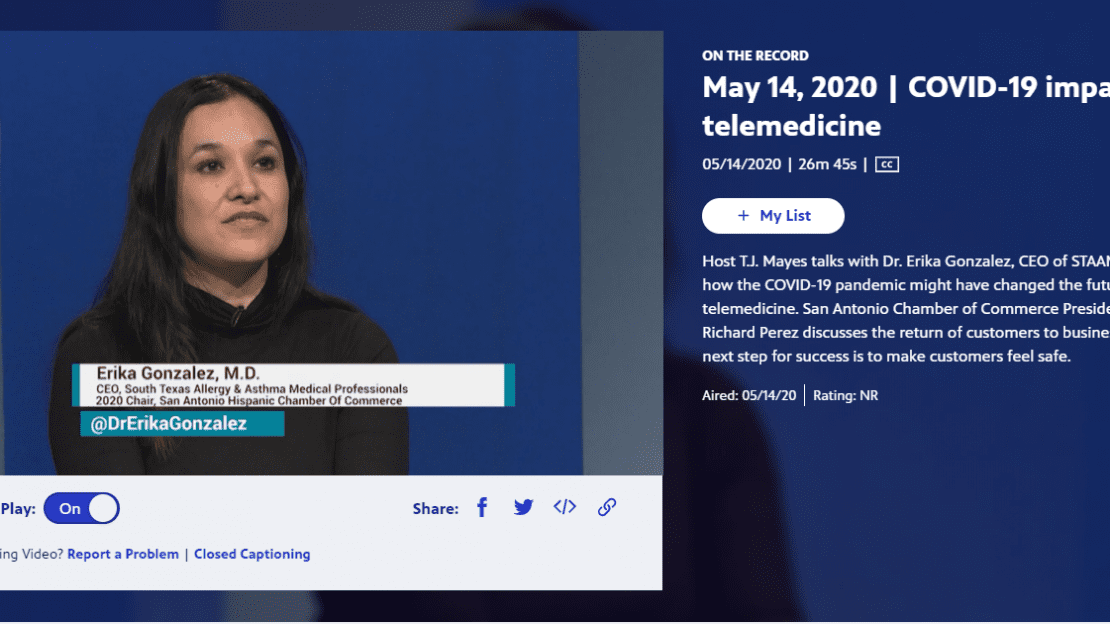
This story was originally published by PBS and can be found here . Host T.J. Mayes talks with Dr. Erika Gonzalez, CEO of STAAMP Allergy, about how the COVID-19 pandemic might have changed the future for telemedicine. San Antonio Chamber of Commerce President and CEO Richard Perez discusses the return of customers to business, and why the next step for success is to make customers feel safe. Aired: 05/14/20
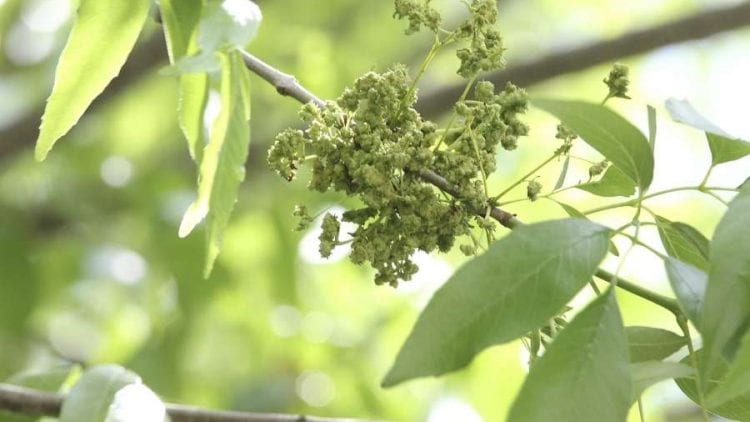
This story was originally published by MYSA and can be found here . The coronavirus pandemic has added a layer of uncertainty and anxiety to allergy season. San Antonio residents are turning to professionals to make sure their symptoms are allergies and not something else. Dr. Erika Gonzalez of South Texas Allergy and Asthma pointed to a couple of symptoms that can help people tell the difference. “If they’re having a dry cough and fevers, then that definitely should clue them in that this is not allergies,” Gonzalez said. “It’s not necessarily COVID — it could be another flu or another virus — but it’s not allergies.” Itching, on the other hand, is associated with allergies. “If people are having itchy eyes, itchy nose, itchy throat, or even itchy ears — you know when your ears are itchy inside — that’s a very reassuring symptom that this is an allergy,” Gonzalez said. The allergist noted that people should feel reassured if their symptoms improve after taking an antihistamine like Zyrtec or Allegra. If you have something other than allergies, you’re not going to feel better by taking those medications . Gonzalez screens patients for COVID-19 and can test for the virus at her practice if they meet the criteria. So far, there have not been any positive cases. The primary treatment for any allergy is to avoid the allergen, Gonzalez said. But that’s difficult as people seek any way to get a little fresh air under a stay-at-home order. While Gonzalez would not recommend against going outside, she did advise people with allergies to avoid peak pollen times early in the morning. She also said taking an antihistamine 30 minutes before going outside can alleviate symptoms. Plus, those masks we’re all being asked to wear will decrease our exposure to pollen, she said. There has been plenty of pollen to avoid this year. Gonzalez noted that oak allergen counts reached a peak of about 3,000 last week, the highest in at least 10 years. On Tuesday, oak — the pollen that leaves a yellow powder behind — counts stood at 2,380. Expect the high pollen levels to stay with us through April, then dwindle in the beginning of May. The levels tend to rise two to three days after rain. Gonzalez said people who suffer from allergies can start with over-the-counter medications, before moving to nasal sprays or allergy shots if necessary.

This story was originally published by NEWS4SA and can be found here . SAN ANTONIO – Instead of a hug or a handshake for loved ones, how about something that comes from the heart? According to a press release from The San Antonio Hispanic Chamber of Commerce (SAHCC) launched the “Heartshake,” or Saludo de Corazon, as the new handshake. The way it works is by placing one hand over your heart and tapping twice, to symbolize “I love you ” or “Hello.” In doing so, the person knows you’re greeting them but social distancing is still practiced.




